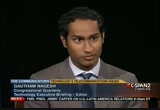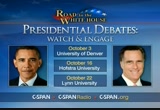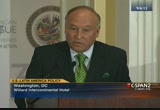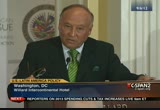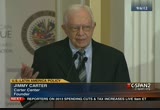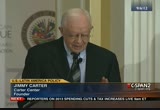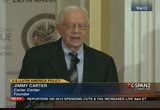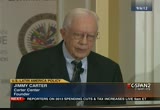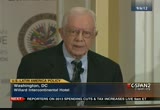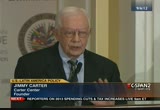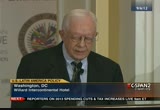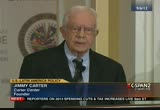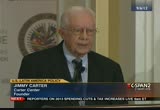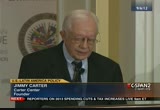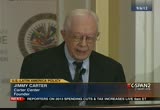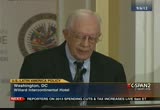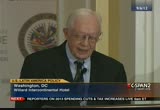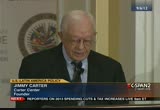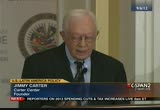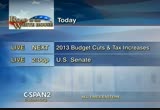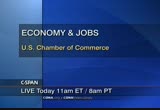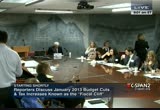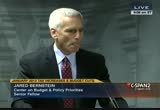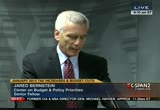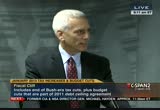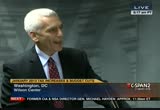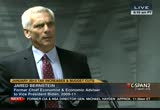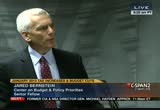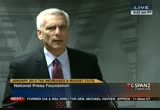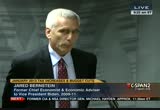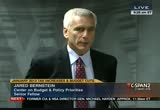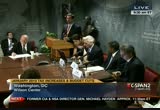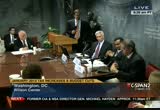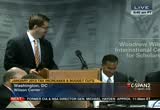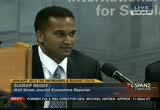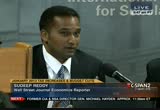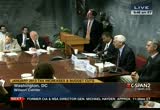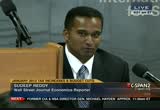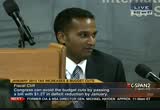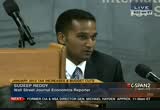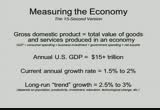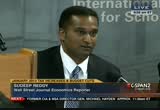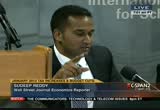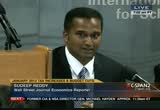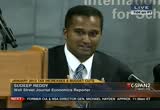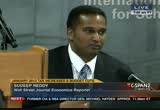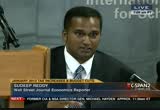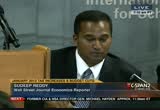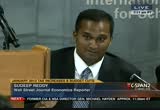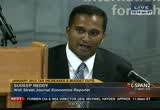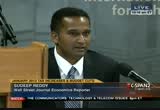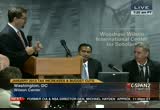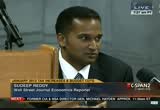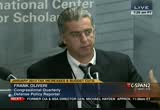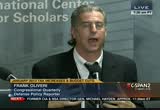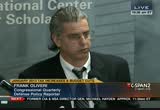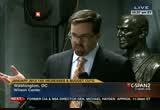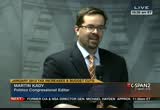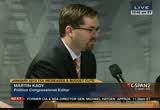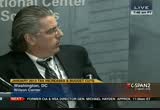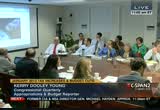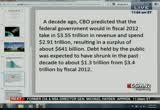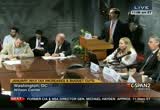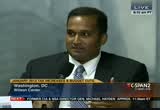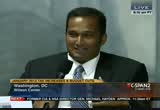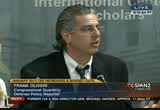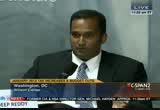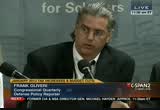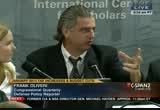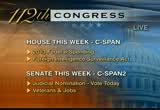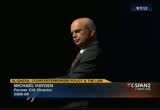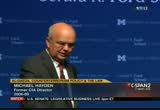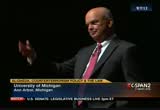tv U.S. Senate CSPAN September 10, 2012 8:30am-12:00pm EDT
8:30 am
the constitution and what a lot of americans believe is correct. and so that's why things like sopa touch such a nerve, that's why things like net neutrality if they're cast in that light can become very devisive issues so i'd like to see, perhaps, congress or the president try to define what they mean. >> host: gautham nagesh, brendan sasso, elizabeth wasserman, thank you all for being on "the communicators" this week. >> guest: thank you. >> "the communicators" also airs each monday night. if you missed any of this discussion on the technology and telecom issues expected in congress this fall, you can watch "the communicators" again tonight at 8 p.m. eastern here on c-span2. and this program can be seen anytime online. log on to our web site at c-span.org, click the series tab and select "the communicators." you can also find other regularly-scheduled programs at the series link.
8:31 am
c-span.org, your online resource for public atears programming. affairs programming. >> watch and engage as presidential candidates meet in 23 days for the first of three debates. as part of c-span's road to the white house coverage. coming up on c-span2, former president jimmy carter talks about u.s./cuba relations at a recent latin america conference. then congressional reporters share their insight on fiscal cliff issues scheduled to take effect early next year. and later, the senate returns from its summer recess at 2 p.m. eastern from legislative business followed at 5 eastern by debate on a roll call vote on a u.s. court nomination for iowa's southern district. >> watch and engage as president obama and republican presidential candidate mitt romney meet next month for three 90-minute debates.
8:32 am
the first is wednesday, october 3rd, at the university of denver focusing on domestic policy. followed by the second debate on tuesday, the 16th, at has that university on long island, new york, as the candidates take questions in a town hall-style format. and the candidates meet a final time on monday, october 23nd, at lynn university in florida as -- 22nd. and the vice presidential candidates meet for their one and only debate on thursday, october 11th, at seven tremendous college in danville, kentucky. watch the debates on c-span, c-span radio or online at c-span.org. >> you're watching c-span2 with politics and public affairs, weekdays featuring live coverage of the u.s. senate. on weeknights watch key public policy events and every weekend the latest nonfiction authors and books on booktv. you can see past programs and get our schedules at our web site, and you can join in the
8:33 am
conversation on social media sites. >> at a recent u.s. latin america conference, former president jimmy carter told the audience that the u.s. should lift its trade embargo against cuba and remove cuba from the state-sponsored terrorist. he also called for stronger relations with latin america. this was hosted by the organization of american state, the development bank of last -- latin america and the latin american dialogue. president carter's speech runs about half an hour. [inaudible conversations] >> well, good afternoon. it's a great honor to have the chance to introduce a great man. we are very pleased that this conference which started with a wonderful presentation by
8:34 am
president fernandez, the keynote speaker during the conference, and now we have the second keynote speaker at the end of the conference and, indeed, it's great honor to have president carter with us. president carter, this morning he woke up at 4:00 in the morning. [laughter] he came from his house which takes about an hour, two hours, in fact, and took a taxi. went to the airport, he got here a few hours ago. he is going to be part, give a speech, be part of -- [inaudible] and after that he goes back home. so it is remarkable. and especially i want to thank you, and i think -- [inaudible] we appreciate very much the effort you are making to come. when one looks at a history of latin america, especially the development in democracy, there is no doubt that president
8:35 am
carter is a key player, a key actor, a fundamental player in having changed the approach towards democracy in latin america. in the days when he was president, let's remember, in latin america had most of the governments, or many of them, were actually military dictators. the issues of human rights were not central issues in the discussion. if you take into account the u.n.'s latin america relationship, essentially pragmatic ones. they were based on economic interests, things of that nature. but the principles of human rights, the principles of building democracies were not really a key element in the agenda. if comes president carter.
8:36 am
he introduced that topic as a very essential topic of the foreign policy of the united states. it was not theory. it became a reality. and one by one the countries of derision which were not used to elections or not used to democratic governments for many years and decades suddenly one after the other started to become democratic governments. and, of course, after he left the presidency he didn't go home to write memoirs and maybe play some golf. he has a beautiful house, i enjoy to visit you. he decided to be, continue being a big player many -- in supporting the same principles, human rights and democracy. and we see president carter going from one country to another observing elections.
8:37 am
he has the ability to have the possibility to talk in friendly, in a friendly way with different actors in the region. i have witnessed that. it could be that maybe some actors are antagonist to the united states. maybe some of the actors do have different views about how the world should function. or different cultures about what democracy is. but president carter has the talent, the ability, the wisdom to interchange ideas, to influence in a positive way the views of those that many times have different views, and to do it in a very, very pleasant way. they like him -- everybody likes
8:38 am
him. i'm not going to mention names or presidents. i know all of them. from knowing some years. and i tell you when we return, president carter -- [inaudible] and i know that as a fact because we have very close relationship with the center, carter center, and we support some of the programs. in many cases and difficult situations in the region. so it cannot be more appropriate to have this final session having, first, president carter. i'm very honored on behalf of the american endowment and myself to welcome you and to thank you very much and welcome. the podium is yours and then after that we'll have -- [inaudible] in which our good friend will
8:39 am
join and will be the one who will moderate that session. so thank you very much, and the podium is yours, president. [applause] >> good afternoon, everybody. good afternoon, everybody. >> afternoon. >> thank you. [laughter] >> president garcia and secretary general silva and my good friend, lionel fernandez, ladies and gentlemen, it's an honor and pleasure for me to be here at this conference to share with you some perspectives on inter-american relationships both in my brief talk and then
8:40 am
in the discussion afterwards. as president, one of the things that i valued most was our membership in the organization of american states. and i made every effort to attend the annual meetings personally. and when i couldn't come, i sent my secretary of state because i thought it was one of the most important relationships that washington had with the rest of the world. it was from my latin neighbors, as a matter of fact, that i learned the importance of correcting the troubled relationship we were having then with panama concerning the canal. and although several of my predecessors had promised to correct that problem, when i became president, i decided to do something about it. and 35 years ago tomorrow i signed the panama canal treaty with rios.
8:41 am
well, in my speech i recognized, and let me quote: the commitment of the united states to the belief that fairness, not force should lie at the heart of our dealings with the nations of the world. if any agreement is to last, it must serve the best interests of both nations. that agreement was very costly politically to me and to the other supporters of the canal, of the treaties. as a matter of fact, there were 20 u.s. senators who voted for the canal treaties who were up for re-election the next year. of the 20 only seven came back into office. and the same thing happened to an incumbent president, i might add. [laughter] but we believed it was the right thing to do, and history has borne it out. and despite the warning of some of to points of the treaties that the panamanians couldn't manage the canal well, they've
8:42 am
done it superbly. just a few years ago i went down to panama, and the incumbent president and i exploded the first dynamite that started the process of doubling the capacity of the ca aal. well, i think the treaties exemplified how two disputing nations can, with fairness and mutual respect, agree to serve the best interests of both of them. fairness means respect for each society's decisions about its own course, but it also means recognizing the inherent value of every individual. in this hemisphere we've sometimes confused respect for another nation's sovereignty with a notion of absolute nonintervention. i know this is partially a response to my own country's history of imposing our ideologies and our interests on others.
8:43 am
sometimes using force. this is mostly when we were in bed with the military dictators who were in charge of a lot of the countries in south america. this past is regrettable, but it cannot be an excuse today for denying human rights or rejecting collective approaches to our shared problems. the concept of fundamental human rights is our common dream, but all of us failed in some way to honor these principles. it's only with a shared commitment that we can build confidence both among citizens and their governments that universal rights will be respected and protected. this is a challenge all of us face every day. as a new president, i announced the latin american policy of nonintervention and the championship of human rights. and as enrique pointed out, the
8:44 am
progress of freedom and democracy since then has made me truly proud. but i'm worried about the common future across this hemisphere. societies are struggling with a basic relationship between government and citizens. the role of the state in managing the economy and how to insure the most vulnerable in our societies can live a decent life. but as we debate and experiment with different ways to address these fundamental issues, we often fall into the trap of disrespecting and denigrating other points of view. and we also fail to agree about the best way forward, we become both polarized and paralyzed. we've seen these deadlocks evolve not just within, but also between our countries. when we've failed to listen or refuse to communicate, we lose our capacity to resolve problems
8:45 am
together that we cannot resolve alone. challenges like illicit drug trafficking, transnational crime and terrorism, enhancing commerce between nations and dealing with climate change. it requires courage and leadership to take the first step to a mutual understanding. i've been particularly impressed recently with juan manuel santos, the president of colombia, as he reaches out to two of his neighbors to restore diplomatic relations. ..
8:46 am
against the people of cuba and that we display no interest in furthering or improving diplomatic relations. all us should continue to press the cuban government but the embargo undermines any credibility that my country has in calling for improvements in cuba. and i fear our democracy-aid program is aimed at regime change and does not promote democracy. unfortunately, the program is used by some in cuba to justify cuban-american gross who i know
8:47 am
might believe to be innocent and keep him in prison. a more sincere diagnose should be held with -- the main reason that united states keeps cuba on the list is that because the et a have officers in cuba, but when i was last in havana, the columbian and the spanish told me that having them there offered them an opportunity for dialogue as evidenced by colombia's announce of new peace talk partially in which cuba. business and civic leaders like many in the audience today should exert your full leadership to promote harmony and justice. the results are not only prelim
8:48 am
but also would be -- in congress and trade. this improvement would be unlimited. we all know that security of citizens is a first responsibility of government. the state must prevent individuals from engaging in criminal and violent act and must pubbish the guilty. however our governments must strike a balance between acting against danger be it domestic or foreign and maintain the fundamental right of dpiew process of law. we must safe guard the hard won gains we have made to prevent the abuse of power when results when executive clips unshaked power without trial and -- consider to pose a threat and conduct surveillance of citizens
8:49 am
without warrants. i hope we will soon correct these mistakes. in against terrorism and crime, it is essential for democracies for provide security without violating human rights. one of the most consequences of the international struggle to combat ill illicit drugs is the families. they pay a price in lost lives within corrupt just system and overcrowded system prisons because we have everybody sized drug eradication and neglected demand for drugs. as president 35 years ago i called for decriminalizes but not legalizing the possession of marijuana. since then understand drug policy have been harmful to our country and cause anen explosion
8:50 am
in prison population. when i left the white house, there were about 500,000 americans in prison. now there are five times as many. the united states has a highest incarceration rate in the world. the number of people in prison for nonviolent crimes involving drugs has increased more than twelve times as many. not only is this policy destroyed the lives of mlt young people and their families especially the poor and minorities. it is wreaking halve vick for the state and local budget. it's time to lock for an alternative approach instead of imprisonment for people who use drugs but do not harm to others. in 1977, i signed the american convention of human rights saying, and i quote again, as
8:51 am
far back as the 20 put forward of concept of human freedom and responsibility of government to protect the rights of individuals. this blank pace on the page has been there far long time. and for the great pleasure that i sign on behalf of the united states this convention on human rights, spell out in clear terms our own belief in the proper relationship between free human beings and governments. although the united states senate has not ralph ratified the senate, 24 other countries signed it and the human rights was born in 1979. the court and commission on human rightses it was created earlier by the oas formed one of the most comprehensive human right systems in the world. we should be proud of the
8:52 am
achiew. and should strive to protect it. they serve citizens who may have no other way to assert their basic rights and demand protection for themselves. we should not see that -- a threat to the authority of governments because rather as our shared obligation to promote and protect universal human rights that we all hold dear. i was proud that my administration gave strong support to the commission which played a role in reducing oppression throughout the hemisphere. but i'm concerned about ongoing problems like the balance of -- freedom of expression of ngo and news media. i'm distiewshed about human rights violence by some government security forces i'm alarmed at human prison conditions in many countries
8:53 am
that threaten the lives of indicted prisoner detained without long periods. yet our american human rights system strives to protect citizens full of these situation. we should protect the system that gives them the protection. we must look for additional ways to strengthen the dependence on human rights and ensure the. strong effective rapport or its are needed to protect children. discrimination against vulnerable groups and freedom of expression. they may need some reforms to be more efficient and the an ton my mu not be reduced. they should carefully we must never let the citizens treasure be weak end. i call on my nation and others to ratify the american convention and join the american. i asked sense venezuela to
8:54 am
reconsider the plans to withdraw. i -- and ensure that the achievements we have made at the hemisphere are not abandoned but instead beyond us. finally, i cannot ignore too two significant election campaigns that are now underway. they hold lessons for all of us. venezuela, elected president on october 7th and the united states a month later. there are many differences between our countries, we have some similarities. most president might deny this, it's true. one is that both countries are combating the fundamental relationship between state and society. what guarantees do our governments to want to provide to our citizens? who will pay pay for the guarantee? what mechanism need to be strength end to ensure that
8:55 am
human rights and fundamental fairness are protected? these are difficult issues and neither country is handling the debate very well. the election are influenced by -- policy that our two countries share, the united states and venezuela with are holdout in the hemisphere in that they do not provide public financing for political campaign. as a matter of fact the u.s. does offer public financial for campaigns when we accepted when we were running for office. but now the candidates reject the financing and the limit that come with it. money in politics undermines the fundament tan and end of democracy, political equality. for some countries, the challenges how to keep illicit money like drug money out of politics.
8:56 am
for the united states the issue ask how to prevent undue influence of money in politics while not infringing on freedom of speech. with the candidates in our cub who are aren't accepting public funding and offering unlimited often anonymous private contributions they flood the air waves with negative ads not subject to campaign regulation. as a result, basic political authority is undermined. since the wealthy have a far greater opportunity. first, through influence the election of candidates, and then for the next four years, to shape public policy. the problem in venezuela an incumbent can place government ads that look like campaign ad and demand broadcast coverage of the speeches. the concern is not private money
8:57 am
inflouncing the campaign, but regard extensive use of public money in state resources in favor of the govern governing party. several latin america countries offer better practices that can benefit all of us, brazil, mexico, chile and many others regulate the advertising. mexico coelected a new president. prohibits negative campaigning and provides $24 million in public financing to each candidate. in contrast, listen to this, the u.s. campaigns for federal office this year will cost more than $6 billion. that's $600 ,000 million dollars. much of it spent on destroying the reputation of opponents. in both venezuela and the united
8:58 am
states, the election will be a great importance. we believe they'll be honest, and we encourage every stots vote. vote in the united states and in venezuela. well, i have discussed as quick as i could fairness and human rights. these are basic qualities in both human and international relationships. we may have different visions of how to address the fundamental changes facing us we will never be able to stress them sphaerly unless we turn to basic civility and a willingness to cooperate based on solution to common values. we must concern with a most vulnerable among us and a commitment to each individual with equity and fairness. it this will provide in the western hems for a bright future a bright future for all of us. thankthank you very much. [applause] >> watch and engage as president
8:59 am
obama and romney meet on october 3rd for the first of three dedicates. as part of the road to the white house coverage. coming up next we'll go live to a forum by the national press foundation as they talk about the impending fiscal cliff involving budget cuts scheduled to take effect in january. senate returns from the august recess for legislative business. followed later with a debate and vote on a u.s. district court nomination for the southern district of iowa. also today the u.s. cam we are -- representative with the chamber discuss the uncertainty with the business community over potential tax increases. august jobs report employment regulation. it gets underway this morning at
9:00 am
9:01 am
congress tax discussion and tax increases in the budget cuts that are set to take effect in january known as the fiscal cliff. this includes the expire bush tax cuts. they could avoid the tax cuts. if they pass $1.2 defense reduction before january. it's expected to start in a moment. [inaudible conversations] [inaudible conversations]
9:03 am
9:04 am
that take effect in january known as the fiscal cliff. it's live from the national press foundation we expect it to get underway in a moment. [inaudible conversations] welling with let me offer an official good morning now. we get started. welcome i'm linda. i'm the directer of program for foundation. we're glad you're here today. and i'm going to hold on one minute. [inaudible conversations] we'll start over again. thanks very much. so good morning everyone and welcome. i'm linda i'm the directer much programs for the national press foundation we're glad you're here this morning.
9:05 am
i want to welcome the paul miller of washington reporting fellows. how many you are here? let me see a somehow of hands. this is a fabulous group. it's the first official meeting of the year. we're getting off to a good start. i want to in particular thank this morning the center on congress at the indiana university, which is one of the cosponsor the for the event. also our host, leer at the wilson center, the partners, politico, i want to thank there their con contribution the eve lynn foundation who is helping us to do a series of programs on financial literacy for journalists. today we're here to talk about the fiscal cliff which is a phrase that none of us had even heard a year ago now it seems like it's practically all we hear or read if we're reading the business section. it's engurnded a lot of
9:06 am
confusion among people. we're fortunate to have with us someone who is initially going to help us understand what it is. what has built the fiscal cliff. this is gerald burn seen policy priority. he's an expert on the things. especially federal and state economic and fiscal policy. he's also the author of a number of books including "crunch" why do i feel so squeezed and nine edition of the state of working america. in the first session, jeer red is going to cover the basic, explain to us what is the fiscal cliff. after that we talk about the implication of the fiscal cliff, what happens if we go over it, how might we avoid that, in the final session aim the directly at journalist we talk about how resources to cover it. so jared, thank you very much. [inaudible] yes, sir.
9:07 am
>> well, if you found yourself up to this room, then you're probably smart enough to figure out to the fiscal cliff. i found it tricky getting in here. i have been here for decades. let me start by saying i'm sorry i have to run at about 9:55 to get to another heated discussion. so i apologize. i'm on to zip through the facts of the case, and leave ample l time for questions because i don't care how careful you are, this can be get confusing. i want people to -- it's a small enough group. if it's okay? why where did linda go? why don't we make it more of a conversation. if i say something that's unclear, raise your hand.
9:08 am
i'll try to clarify. if it's more of a philosophical questions and there are deep philosophical questions engendered here. we'll put it off for a couple of minutes. i like to think the origin well before, i think a lot of people who dwell on? most people i think think of this as directly coming out of the bucket control act of 2011 i'll get to that in a minute. it did. but in fact, the origin of the fiscal cliff were planted other a decade ago in the initial tax cuts pursued by the george w. bush administration. these tax cuts, which take place in 2001 and 2003. i'm sure you've heard people talk if you listen to -- fiscal policy in the campaign somebody is going to say bush tax cuts. that's what they're talking about the 2001 and '03 tax cuts.
9:09 am
those cuts were passed with a bit of a time bomb implanted in them. they were not legislatelated to be permanent. they were legislated to last ten years or seven years in the case of the 2003 version they were going expire at the end of 2010. part of this was to squeeze the tax cuts, of course when you cut tax, you lose revenue as far as cfo is concerned. their the score keepers of sump thing, and oath to make the budget window look better after the first ten years of the tax cuts being in place, the tax cuts were scored to end legislative and end after the decade. they were also passed think something called reconciliation. we can get in to more details about that. it's another constraint that lead them to be simply ten years. there's no why reason why congress couldn't have said they with two-year tax cuts or
9:10 am
twenty-year tax cuts or forever-tax cuts. they made them ten-year tax cuts. >> didn't we pit hit the fiscal cliff in 2010. we did. i was working for the white house then. in december 2010, there was a december deal, between the president, democrat and republican leadership. to extend these tax cuts for another couple of years. guess what? another couple of years is almost over. that's fiscal arcology of the origin. more appointly getting to the origin of the fiscal cliff as we know and love it today. you have to go back to 2011 and talk about the debt celling debate. in 2011, the u.s. treasury was
9:11 am
about to bump up against something called the debt celling. in legislation, there is an amount above which it's in some number of trillions the amount above which the government may not borrow to finance the debt and to make the interesting payments right now as folks may know that we owe about $10 trillion in terms of debt that's owe to the public. there's another set of debt we owe to ourself. that's not relevant here. the debt we owe to the public, is debt we have to pay interest on. and if we don't pay the interest on the debt. we default just like you default and ford motor company if you didn't pay your mortgage. we had the historically we have run in to the debt ceiling many times because it's just a number that is dollars. under the reagean years, it was raised many time i think something like a dozen times. and it was never a big deal. in fact, there was the first
9:12 am
time in my whole career following the stuff that the debt ceiling became a big debate. it was contester. you may remember there were members of congress who were essentially saying i don't care if we default. i don't believe it. i'm not going sign on to a higher debt ceiling. i'm not going to put my rubber stamp on more borrowing. we talk about that the politics on that or whether it was spornl. it was the position of members of congress who refused to rubber stamp an increase in the debt ceiling. it lead to a big squabble. the next thing you know, you have this agreement in the summer of 2011, which extended the debt ceiling, that was the key part of this budget control act. the government defoughts and lots of bad things happen. i can tell you, but they're not relate to the fiscal cliff. they -- they are downright terrible. we have never come anywhere near to defaulting and there's no
9:13 am
reason we should. so that really wasn't the debacle. that was a major self-inflicted wound which i believe hurt the continue and to reverberate. so as part of the budget control act, a couple of things happened, there was the president was allowed to raise the debt limit by about $2 trillion, and that's estimated to be sufficient to get the debt ceiling up to where it needs to be sufficient through early 2013, so i have -- i'm afraid i'm a bearer of not good news. you're making me talk about an unhappy topic. how about rg3 yesterday? but we have this debt ceiling that we're going bump up against again in early 2013. so that was one thing that happened in this act. then the budget control act
9:14 am
established limits or caps on a appropriations on spending. i was on tv this morning at 6:30 arguing this point. on cnbc someone said nobody cut any spending yet. that's wrong, in fact there was a trillion dollars of spending cuts in the budget control act which have been implemented by lower the caps on appropriations. and so that's a trillion dollars for 2021 relative to -- i we won't go deeply in to that. part of the bca controlling act there were spending cuts. now we are heading to the cliff. we want another $1.2 trillion spending in cuts with about house and senate have to move legislation to reduce projected budget deficit by at least $1.2 trillion through 2021, and if
9:15 am
they fail to do that, they're going have to form a committee of members of both houses of congress, i think it was six d and six r. remember the supercommittee in they were going to have to come up with recommendation to congress how to save another $2.1 trillion beyond the savings that were already in the lower caps i mentioned. they're baked in the cake. they are already in play. if the super committee fails, okay, here we are. at the cliff, if the super committee fails, there is a fall back mechanism, as it were called. budget sequestration which is automatic budget cuts to the tune of $1.2 trillion in deficit reduction that have to be implemented automatically a cross the board budget cuts. mostly almost exclusively on the dispretion their side of the
9:16 am
budget. the budget has two sides discretionary appropriatedded every year and mandatory the entitlements they run on automatically. for the most part, there's a couple of cup cuts on the mandatory side 2% cut in provider payments on medicare. that's part of the fiscal cliff. the cuts are split defeat defense and nondefense. those are the two sides of the discretionary part of the budget. and it turns out to be if you do the math, you have to account for interest payment finance turns out that about $1 10 billion. 109.3 -- about $1 10 billion of spending cuts will automatically occur in 2013 because of the super committee failed to come up with a deficit reduction deal as required if in the budget control act. that's part -- two.
9:17 am
part one i told you about. all of the bush tax cuts expire in december 33st another midnight. like sinned cell the fairy princess. there's all stuff that expires. there's a number of policies that i associate them with stimulus to help offset the ongoing demand contraction in the economy this continues to be a tough problem for us, i'm sure folks know that the relatively weak jobs report from august. so, you know, we've had -- as part of the december 2010 deal i mentioned the bush tax cuts extend pnd there was a payroll fax cut implementedded at that time. there was extension of unemployment that was implemented at that time. that's also, those also expire at end of this year.
9:18 am
and at end of 2012. you have something to the tune of according to the cbo around $600 billion in basically deficit reduction in 2013. most of that comes from these tax benefits either expiring like the payroll tax cut or safety net employment insurance, extension i mentioned and the tax rates resetting as the bush tax cuts ultimately reset them. and another chunk comes from the automatic spending cuts. we have tax increases and spending cuts to the tune of i don't know 3 and a half% of gdp. it's a night mare. the economy -- i'm talking to you an as economist. and i -- let me tell you, be clear i'm talking to you in the sense of an economist. another way of looking at it is to say that's significant deficit reduction and we have a
9:19 am
big plan. going from the deficit this year which is about $1.1 something trillion going from this year's deficit down to something like $600 billion, it's huge accomplishment in term of deficit reduction. you might say what is wrong with that? i said it. clearly you know we have a long-term fiscal problem and the problem is that it's sort of like taking a dose of medicine you need but you take so much at once it kills you. the economy cannot sustain -- the economy is already mentioned is a bit of wobbly bicycle can't sustain a miscall reduction of that. they rarely forecast as boldly as i did. it's not physical science. it's economics and it's -- the center -- the congressional budget office and other veterans
9:20 am
in the room, correct me if i'm wrong about this. i don't know that the congressional pujt officer has ever done what they're doing with regard to the deliberation or their able sei. they predict they will hit a recession. we go back in to recession. they are careful about making such claims. they predict the economy will go back in to recession. and gdp will retract 3% in the next year. 12.9% in the next year. and employment is now 8.1. went down in august. will go up to 9.1. unemployment has been coming down too slowly for sure. it will reverse course according to cbo and go up to 9.1% if we go over the fiscal cliff and stay over it. there's a scenario, i'll talk more about that maybe later, about kind of solutions scenarios. there's one that i'm partial
9:21 am
towards a number of them. there's one that is more of a fiscal cliff is a slump all the damage that cbo projects occur if you quickly turn around and go back up. i'm getting ahead of myself. that's the lay of the land. that's history, the lay of the land. we're that's what we're looking at here. before i talk about other things i talk about linda, i'd see if there are any questions, if that's okay with you. [inaudible] [inaudible] is there any consequence that the didn't release the trarns parent sei congress -- the sequestration? >> right. you'll is there any consequence in terms ofline like some legal
9:22 am
action? >> right. you hear the agencies can't plan for the future. the private sector can't plan for the future. whether that's believable. what is the result that have not knowing what's coming. >> that's a bigger question. it has to do with the impact of the fiscal cliff. and in your case, he's talk about the sequestration. the automatic cuts because the automatic cuts, remember, there two sides to the budget. mandatory and dispretion their. i'm sorry if i'm talking past people. if this is old news, i apologize nor not pitching this high enough. but i find this stuff, and i have done it for a long time, useful to break it down to the building blocks and if you want me to go -- i can probably go in the deep as weeds you'd like. hopefully -- let me see heads nodding is this a level that is useful to people? okay, good. we are talking about the appropriation side of the budget.
9:23 am
the gentleman's question. let me answer that first. the agency's by the automatic cuts are supposed to be made across the board or portion nately across the agency. i read something on the defense side. the way it's set up according to scott lily. he's latest setup is proportional if you're a shipbuilder and building ten ships for the navy and have 0 to have a 10 fortunate reduction. you can't do a cost on the one ship. you are have to do the cost reduction on the ten ships you're building. that's the way it is laid out. proportionate across the board cut. i don't know that it's -- and that's what, by the way, i expect to come out of the omb
9:24 am
report which won't be in my view informative. here are the budget lines and it's something like 8.5% next year in term of the discretionary cuts or at least on the nondefense side i have the numbers here. a little bit less on the defense side. and, you know, it's going to say we're going take x percent from each one of these categories. i think this is a little bit of a way that politicians are trying to jam the white house and make them produce something. they will they shouldn't be late. i figure you won't learn a lot from it. whether agencies can plan for this? the agency -- i guess in my view, it's not that hard for the agency is to plan for it. what's hard is the result the malt lit the dollars go out to the country and they fund stuff. the faa, which is an agency that gets administration federal
9:25 am
aviation administration that gets funded through appropriations annually. has a bunch of projects in play according to scott's calculations he a took a particular airport in arkansas it's going to have to close, probably. they won't be able to fund their air traffic controller staff. they have to cut they have to country one. there's a rule that says you have to a certain number of the people doing air traffic controller. they have to close. they can't reduce that the services. they have to close. it's a obviously disruptive. so that's one that's the kind of way this plays out in the real world on the defense side, terrorist been a lot of hang ringing about government contracts. we do about a hatch of trillion in government contracting every
9:26 am
years. there's a lot of businesses that depend on it. i, by the way, as an economist found it benewsing with if that's the word to watch the members much congress who go around saying the economics doesn't work. it doesn't create jobs and all the sudden with the automatic spending cut this is a job killer. clearly they both can't be right. and in fact, government spending creates many millions of jobs obviously. i'm not saying i'm for it. we can argue about whether we overdo that or underdo that whatever. that's a different discussion. you can't argue about the fact it doesn't create jobs. it does. we wouldn't feel the hand wringing around the sequestration. there's 0 million government jobs. [laughter] that's a lack of a claim anyway. >> do we have one more question before we a couple more voices
9:27 am
in to the conversation? anybody? you had mentioned that if we didn't raise the debt ceiling we defaulted on certain payments that would be a catastrophe. >> yes. >> i'm just -- you said that we can go in to details about what would happen. i'm curious. >> it's a good question. >> well, nobody would want to lend us anymore money. [laughter] and like it or not, we owe a lot of money to a lot of different countries, in fact. and to a lot of -- most of it is here, by the way, most of our creditors are domestic. there are countries all over. china is big lender. about 10% of our debt is owed to china. in order continue to provide the goods and services that the public goods and services that make the country run, we would have to try to borrow money because we couldn't do if without that and the interest
9:28 am
rates would be prohibitive. who would lend money to a country that defaulted. if you start looking around europe, it's a great example. spain and italy haven't defaulted yet. greece hasn't defaulted yet. greece view greece as being on the verge. if you look at what they have to pay to borrow the ten-year bonds the government has to pay an interest rate of 1.5% or 1.7% really low. in spain in italy it's been up to 6%. in greece it's 20%. we simply couldn't -- it's pretty simple. our creditors simply wouldn't deal with us. >> i think we're ready to start the next panel, right? do you qie -- guys want to come up? thanks. actually, i'll stand.
9:29 am
okay. we're going to start the panel. i'm marty katie the congressional leader of "politico." i've been doing the panels for almost a year and a half. we have a great panel. i think the next session is what would it mean -- [inaudible] in a couple more [inaudible] thanks for the great overview and starting on the end there, my friend [inaudible] "cq" colleague frank -- what is your title? i'm defensive foreign policy reporter. you've been doing that for a long time. 23 years and you're going to be the expert on defense, sequester, help us understand how it works and frank's right is a staff reporter from the "the wall street journal," you cover the u.s. international economics and you're also one of the residence budget experts. you can help us understand where
9:30 am
a lot of this is headed. and the is fiscal cliff is something -- do you want me to speak in to this or this? i like holding a microphone. [laughter] it's cool. we want to sort of start to break it down topic by topic what would it mean? i would like to start with frank and work the way toward the middle. the sequester is something that people are starting to talk about in a serious way. when we were doing stories, i kept et didding people sequester. now the search -- you know that. we people start to search it. what does mean and candidates are talking about it in swings states. lindsay graham and john mccain are doing a jobs tour. they have better than in to florida and florida. can you give us an overview, frank, and walk through the mechanics.
9:31 am
it doesn't mean the money is going to be cut in january 2013. no. >> it's a thing that happened over time. but there's a lot of -- process that already to starting to unfold defense contractors say they have to put up layoff notices. can you give us the real-world perspective how the sequester will work and why we need to start paying attention to it right now. >> okay. the sequester, you know, has, you know, as dr. bern seen said earlier they are going to' about a $55 billion cut. it sets a baseline where they built caps to get to a certain amount of savings with the defense and nondefense discretionary they're hoping to raise 1 % -- 1.are 2 trillion. the near that a lot of people have about this is that defense is already come up with a plan to find savings over the next
9:32 am
ten years from about 487 $490 billion. i'm a little less in to the fear mongering that seems to go on around defense cuts in general. we have a done a loot -- a lot of looking at the details. and the $487 billion was a plan cut to projected growth and defense. there is a real cut an actual cut it's not $487 billion. so because defense department was spending on a lot more money over the next decade. you'll learn as we talk through this that projecting budgets out for five years is kind of dark magicked at the defense department. it rarely ever turns out that way. projecting over ten years with is kind of like trying to figure out what dark matter is. you see shadows we you don't actually see anything. a lot is tied up in the horse race, which i think marty's
9:33 am
paper does a lot more than the "cq" does. there's a lot of horse race that gets in to the politics of sequester. i did a story on the horse races early in the years. it comes to a fight over who's fault it is. right now -- nobody is coming up with a plan to avert sequester. you're hearing different sides aig a the air -- you have the chairman of lockheed martin, pratt whitney coming up in front of the house armed service committee talking about putting out the notices. so you a federal department coming out and saying you really don't need to put out the notices because it's not knowable yesterday as to whether or not there will be a sequester. z we know about congress, there's a lot of "cq" in the room. with know, congress never does anything until it must. and one of the things that we're
9:34 am
learning about sequester is we don't know really when it's going to fall. we know on january 2nd it's supposed to happen. the officer of manage and budget is expected to manage what happened. there's a thing called apportionment, for example, one of our reporter that it did a fine story talking about how omb can cans decide when they start to apply sequester. it could be in the last quarter of the coming fiscal year before they do now the cuts as a percent age of the whole will be more severe. but it gives congress more time to figure out what to do. so it's a pretty tough situation. what you have is both sides are demagoguing the issue. they're using sequester to win an argument. the republicans are saying that sequester which was the residence idea it is kind of laughable that either side tries to blame the other. the majority in congress supported sequester being part
9:35 am
of the budget control act. there's a lot of unknowables here. there's a lot of things that could transpire that change things. i did a cover story for "cq" we wanted to know what happened when sequester hit balance could happen and in managing it, the assumption about sequester and about anything is that everything stops here. now whether you're talking about medicare, whether you're talking about social security, whether you're talking about sequester, everything is assuming you will do nothing between now and when it happens. which never happens. it has never happened that way. they always find a way. there's a deal that's made to push the things off. the president proposed a deal that would push out medicare insolve sei eight years. the republicans now the democrats say the republican plan would roll it back eight years. all of this stuffer is incredibly -- that is the difficulty in covering defense in this age because one of the things that we know about defense is, it's incredibly
9:36 am
costly business and there's enormous amounts of dollars and interest statewide parochial interest you have three interest groups to feed off of this. you have congress and the parochial interest and the pentagon with the interest and projecting out the programs and you have the industry which making huge bucks off of this. it's a mix the up kind of confused picture. and oftentimes you, you know, the defense department other sort of the dark magic. they can't do ab add it at the defense budget. if when you get down to literal dollars and cents. they can't tell you how how much they spend. they try to cut a command a couple of years ago and projected out when they were going to save. it was in virginia, joint forces command, and when they finally shut it down, they actually found out they saved twice as much as what they said they would save.
9:37 am
which just tell you they don't know what tier they're spending. it's a remarkable development when you think about that pane the defense budget represents a huge part of the budget with the war and base defense spending you're talking well over $600 billion in discretionary funding per year. it's a complicating thing. right now we don't have answers. i mean, we don't have answers because because it's caught up in the horse race. everything is caught up in the horse race. they're trying to blame, trying to figure -- you know, some of races in a state like virginia it'll come down to who can make the case that it was x party's fault for skisser to happen want interesting thing, the biggest hater of best ander bucks hates sequester he actually voted for the patrol act. , you know, his counter part adam smith who hates sequester cho who is a democrat voted against it.
9:38 am
you find it across the board. there's no clean answers here. and at end of the day everybody is respondent for it. so, you know, . >> can i ask you a question that i think is . >> sure. >> i've been hoping to run in to someone like you. it's my understanding that a lot of the -- one of the things i'm concerned about is the stuff about jobs. we have fridge l job situation already. it's my understanding that a lot of defense contracting and hiring has a multiyear lag. so that employment that is currently in place in factories and producers along the supply chain making the stuff is funded by contracts that are a year or two old. we might not see -- if we did tsh i'm noted a voting we go over the cliff. we see the automatic cuts, what impact -- would it have less impact on employment because of the discussion. >> we've been asking a lot of
9:39 am
questions about this. definitely department deals in two times of number which is budget authority which congress gives. it says you have budget authority to spend this much and they appropriate the authority. and there's a thing called budget outlays and this it the money that is actually spend by treasury on the various different eye times inspect budget authority we conveniently like to budget focus on budget authority. it's easier to go. the but the outlays deal with how money is spend out. right now the defense department is spending money and defense contractors are spending money that may have been authorized a year ago or two years ago. now there radiosome accounts that spend more quickly than ores. operations in maintenance which is a huge portion of the defense budget spends quickly. you have the personnel, that spends very quick my. that's exempt. that's an interesting point in sequester, i didn't get in to your building blocks.
9:40 am
that's a good point. the president and omb will set the standards for how scwesser is applied. currently they have decided to exempt personnel. now that -- that makes sense in one regard because you don't want to layoff a whole bunch of experienced war fighters. we have the experienced military in the world ever. we have been at war for an all of number of years. we vitamin an -- the economy will take a huge hit if we play the people off. they don't want what to do that. sequester gets applied more heavily to other areas. it gets to adjustment and macking sequester. they have now said the budget control act the overseas war fund was ement cemented from bca caps. so the initial savings exempted. people like daniel inn -- said
9:41 am
that we will use the fund the overseas continue sei operation fund grow so we create flexibility. they love to use it to shift money back and forth it creates flexibility. except now there is an existing twist they came out and said however they will be susceptible to sequester. it may sound terrible like my god the guys in the front lines suffer heavily. he has done is added 5.9 to elevate the cost. and they blow it up and it allows them to freed out the payments sequester a little bit more across the now you're $600 billion in. but so there's a -- get me back to your question. i'm diving in on . >> i was just. just my simple point is that if
9:42 am
the defense sequester went in to effect in january 1, it doesn't necessarily mean a bunch of the defense workers get laid off right way. they might be . >> can i ask about the warn act being talked a lot from the defense contractor saying. we have announce massive layoffs days before the election. and can you talk about whether that's a political thing or a real thing? >> i think that it's both. it's both. the -- figure labor department or somebody came out and basically said you continue have to sent the letters out. >> explain what it is. >> you gives sixty days. when you're doing mass layoff the warren act said you need to tell everybody. it applies to everybody. and in defense, you know, the defense industry has come out
9:43 am
and say, you know, that we we're looking at pretty heavy layoffs here, what doctor is implying with expwrowt lays is the defense folks wouldn't have to make cuts immediately. publicly owned companies oftentimes use moments like these to find efficiency to save money. they do layoffs. and if they're doing to do mass ones they have to notify people. in the political con context the administration thinks and they make the case that not knowable yet, it's not definite there will be layoffs you shouldn't. because it will be disruptive to the economy. and everybody though it is will be disruptive to the economy. now where the difference ised in the law lie. who is going to prosecute these things and go out? it's like the earlier question about the sequester we're begin to learn about the sequester this week. that's what we learned of dubious content we're in place of not knowing and the administration may not want to share everything. they like the pressure it
9:44 am
creates on the congress to come up with some kind of a deal. when we learn about the things peace mail it starts to have an effect on the economy. suddenly sends out the war -- that's going cause direction. both sides disagree on this. we're in the middle of an election. how it plays is unnoble. >> let me turn away from deference. i know, you have a presentation. you have to leave. let's switch so we can have you in front of the computer? >> sure. ..
9:45 am
>> hopes you understand a little bit around that. a couple things i actually wanted to talk through actually with jared here is why is when he get to this point about the debt ceiling, why are we all arguing about the size of the debt when every time you look at the news, the u.s. government borrowing costs have dropped lower and lower? why is this even a debate right now? and one of the big reasons it's become a debate is, in part, due to a study that i've referenced here.
9:46 am
ken rogoff did a, wrote a recent book looking at 800 years of government borrowing, but this particular study goes back more like half a century and looks at government or borrowing. and what they conclude in the abstract is that once you get to 90% debt to gdp ratio of 90%, you actually start facing risks to your economy. and what they found is that growth flows by about 1% annually once you get to that point. this is a very simplified version of their exhaustive study, but a lot of people are citing this. and one of the most maddening things about covering economics in this town is everyone tries to redefine what happens, what basic economic theory means. and this is a particular point that's going to come up a lot because a lot of people think that we've reached the breaking point when it comes to u.s.
9:47 am
government debt. and if you were to actually look at two figures i've put up here, they are both figures of u.s. debt, one is u.s. gross debt which is $16 trillion, and that would be 100% of gdp which presumably is over that debt to gdp target and should p mean over time u.s. economy's going to be slower because of higher debt. but we, obviously, can't have that slower growth if our interest rates are as low as they are now. 72% of ddp is debt -- gdp is debt held by the public, and there is actually a somewhat interesting debate among economists on which figure you should use in interpreting the reinhart/rogoff study, and it's not actually possible to get a clear answer on this because even their own work looked at both different types of figures across economies. and so i'm interested -- >> well, yeah, let me just quickly respond to sudeep.
9:48 am
he just took you through, and i thought artfully, a huge debate and one of great consequence. very confusing, i think, because of all the, on on the one hand, issues that sudeep just raised. i'm going to give you my view which, i would argue s the correct one. [laughter] so let's just keep it simple. first of all, who do you believe vis-a-vis gross debt versus debt held by the public. well, cbo, i consider them to be a very nonpartisan scorekeeper in this town, and i always get my feathers ruffled when you're in a debate with someone, and you're using cbo numbers and they object and have their own cake baking. it's the debt held by the public that determines the interest rates on bonds that we, on our borrowing, on bonds. and that's absolutely true. so if the story here that reinhart and rogoff are telling, which it is, is about the cost of borrowing, the reason growth slows is because so much public borrowing crowds out private
9:49 am
borrowing, then the variable you want to look at is the rate of interest. the rate of interest right now is very low, as sudeep said, so, it's rate held by the public matters and, b, i don't believe they're 90% very much. i do believe that we have an unsustainable budget problem, and we've got to fix it. so i don't care if it's 12 the % or 112%. what matters much more than the level of the debt is the direction, and the direction is straight up unless we get our act together. um, we had a debt to gdp ratio of about 120% after world war ii. about ten years later, it was 50%. i'm telling you, the key to markets and fiscal sustainability is the direction of the debt. that shouldn't make you feel particularly good because the direction of the debt is all wrong. but i wouldn't get too wound up on any particular level. there's too many moving parts to say this level's unacceptable. 89% is okay, but 91% isn't?
9:50 am
it doesn't work that way. >> can i just -- that's one of the reasons, though, there's fear about the, about inflation and things like that because if suddenly interest rates were to jump on us even a couple of percentage points, that could translate into billions and billions of dollars. >> that's a good point. >> exactly. these things happen suddenly and without that much warning once -- there's usually some kind of precipitating effect in other economies where you see this, where the market just turns around on governments. you're seeing this in european countries because they've had so many years of problems. but i also want to stress that the united states is not like europe, and anyone who tries to tell you that, um, in that sense is trying to mislead you because if somebody says the u.s. is going to become like greece, greece's debt to gdp ratio if you just look at core numbers is above 160% of gdp, but the bigger problem in greece is that greece cannot devalue its currency. it doesn't control its own
9:51 am
currency. the u.s. does control its currency, it is also the most important currency in the world which means everyone's rushing toward it instead of trying to flee from it -- >> it's a great example of what i just said because if i told you the debt to gdp ratio in greece is 50%, i doubt you'd feel a ton better about greece because they don't collect their taxes, it's the currency issue he mentioned. they've got so many structural problems -- i mean, 160 is worse than 50, don't get me wrong. but you know what i mean. >> yeah. you heard in the campaigns, we don't want to become greece. can you explain how these trend lines will effect our economy? we're not greece, we're not spain, but how will these current trend lines, the direction we're headed whether we go off the fiscal cliff, partially off the fiscal cliff or we just punt the can down the road six months or a year which seems like the direction the congress is headed. >> you can put three economists
9:52 am
in the room and get three different opinions on something. everyone agrees, as jared just said, the trajectory for our debt right now is unsustainable. nobody knows what that figure is. you will hit some point that you cannot identify where the bond market decides, where investors decide it is not worth borrowing at the same level, worth lending to the united states at the same level you were willing to lend before, and you will charge more. the more likely trigger of something like this is, um, is united states congress doing something incredibly stupid like defaulting or if you were to see atydivergence between the u.s. economy and, say, emerging market economies to the point where they became better vehicles for investors, then they might -- investors might start to shift in that direction, and that would probably be more of a slow change rather than a sudden, abrupt change. and, of course, if you were to
9:53 am
see further downgrades in the u.s. debt, we don't know what would happen if you were to see more downgrades. it's possible that you could see higher borrowing costs for the united states which, of course, makes the entire budget problem a much bigger mess. but as we learned last august with the debt downgrade, that actually lowered our borrowing costs because investors rushed into the united states. they were looking for the arms of a safe government to park their money rather than anywhere else. and that's fairly telling about where we are as a country right now, that we're still seen as the safest place to put your money. >> but if we get past the election and into november and december without any sort of resolution on any of the main elements of the fiscal cliff, do you think there's going to be an adverse market reaction, a market shock? or do you think the markets, like they usually do, are baking in certain outcomes? >> i have to leave, so let me just be a little provocative and then jump out. [laughter] i'm afraid we're probably going to careen over the fiscal cliff. i have a hard time -- these, the
9:54 am
three of you can speak probably more authoritatively to the politics at play here than i can. but when i look at different scenarios, i view us as somewhat likely to go over the cliff. i think the answer vis-a-vis markets is that if there, if it looks like postelection, post-lame duck january that there are enough grown-ups in the room talking about a plan to reverse the impacts quickly, then i don't think the markets or the economy will have an especially large negative reaction. i don't think it'll be good, i think it'll be really bad. we already, we really, this economy really doesn't need another self-inflicted wound, and that's what this would be. however, if we can turn around quickly, it won't be a deep wound. so the answer to your question is i think that it'll be, as i said earlier, i view it more as a slope than a cliff. it gets worse as you go along. if we can reverse it quickly, i think we'll be okay, but i'd
9:55 am
much rather us not have to go there. >> and you have to go. thanks so much for spending so much time with us this morning. we're going to continue the panel, but -- >> thank you, jared. [applause] >> sorry, panel. i'm leaving you in good hands. >> can i -- >> yeah. >> -- actually just walk through a few more things? >> oh, yeah. i didn't mean to interrupt your -- >> an excellent economist and did, i thought, a fairly balanced portrayal for you on some of these issues here. i wanted to walk through a few other numbers in case you haven't really dealt with economics, didn't take -- slept through your high school and freshman economics courses to get you up to speed in about two minutes on some of the things that you'll see in terms of numbers. um, i actually think if you are covering this issue, you should go get the latest cbo report on their latest budget and economic outlook update. a lot of it is easily digestible if you actually haven't studied economics or followed any of
9:56 am
this before, and it's worth looking into because despite what you might hear on cap until hill, they -- capitol hill, they actually do a very balanced, fair portrayal of the issues here, and it's worth deferring a lot to the cbo because there are people there who, i think, are dispassionate in doing their analysis. um, a couple of figures here. you've seen the -- if you have taken an economics course, the basic formula for measuring gdp, i include this because there is a simple formula here that is based on arithmetic that you have to look at, and it's gdp is basically total consumer spending, business investment, government spending and net exports. i include this because there is a figure for government spending in here and when you remove government spending from the economy, gdp will go down. and that's a simple mathematical fact that at least in the short run you cannot argue against.
9:57 am
you can -- the argument you're hearing a lot is that cutting government spending will boost the economy, and the only reason they're saying that is because they believe that it will increase the confidence among consumers in the areas of consumer spending and business investment. but there is a short run effect when you take out government spending, and you have to calculate that. that's actually a critical figure, critical issue to understand why the fiscal cliff occurs to the point where if you're looking at the cbo figures, you see a recession in the first half of 2013 and then a recovery after that. and that's a fairly important issue. i'll let you, you can take a look at the pretty charts later. these are -- if you ever need to get economic data, the st. louis fed has an excellent web site that gets data from around the world that's worth looking at. um, you know, the components of the fiscal cliff and as jared said, going through the, going over the cliff would be a recession in the first half of
9:58 am
2013. there is no debate about this. there will be a recession if you go over the fiscal cliff because you cannot raise taxes on so many people and cut government spending at the same time and not have an economic effect. it's just, it is not conceivable that that's possible. but, of course, as he said, you'd also lower the deficit. the issue that you have to think about in all of this is the credit rating effect, which nobody really knows the effect of a credit rating cut, but we know if you were to just kick the can down the road for, say, a year, it is almost certain that you would see further credit rating downgrades. and while u.s. borrowing costs did drop after a credit rating downgrade, it creates other problems because it raises investors' awareness about sovereign borrowing costs and risks. so the risks of government debt not just in the united states, but around the world. and so a credit rating cut in the united states might not actually effect the united states, but it could draw investors to look at, say, spain and italy and realize that they
9:59 am
need to start thinking more about political risks involved in other economies. most investors are probably looking at that already -- >> i was going to ask you a question. can you say, can you tell or recall how much money left the markets when just the threat of the failure to raise the debt ceiling was out there? i mean, a lot of the instability in the markets and our economy is coming from the sort of gridlock that's here, right? >> right. it is very difficult to measure, and one of the things you'll find in looking at the economy is there's so many things going on that it's almost impossible to pinpoint one specific issue. last july and august as we were threatening to inflict a wound on ourselves, the europeans were doing one to themselves. so it's hard to see what part was the united states debt rating downgrade that led stocks to drop precipitously in august and september and what part was august, -- europe. i include this pirg in here,
10:00 am
um -- figure in here, um, these are from two investment banks. there are ph.d. economists who run through the numbers, and this actually will help you understand that there are specific costs for each individual measure, and you can see i include two of them here because you can see that different economists will look at this differently in estimating what the effect on the economy will be. um, if you look at michael forly's from jpmorgan on the left side, he looks at the bush tax cuts expiring, $280 billion. morgan stanley, david greenlaw sees it as $323 billion. there are all different figures you could come up with these numbers, it could involve how much people are saving from their tax cuts or how much consumer spending drops as a result of a tax increase. all those things are actually difficult to tease out which is why these are all highly variable estimates. and some of the figures you heard mentioned early, going
10:01 am
over the fiscal cliff, the alternative scenario is this version that the cbo came up with if you were to actually extend a lot of the provisions. and this is a really important one because it shows you what the cost of kicking the can down the road is verse is us actually having a recession which nobody wallets. but if you were to go through the fiscal cliff, then you would actually see the u.s. debt held by the public, the figure we were talking about, fall over time instead of rise. and so the -- and this is the debt to gdp, deficit as a share of gdp. the goal here that you want to think about is trying to -- right now u.s., the u.s. deficit as a share of gdp. so if you were to look at the total deficit of 1, 15 -- one,
10:02 am
one-and-a-half trillion dollars over the last three or four years, that's at its peak almost 10% of gdp. what you're trying to get down to is about 3% of gdp, and you want that because that's roughly in line with the growth in the economy. and so if you were to have your debt growing at the same pace the economy's going, you can actually manage that and keep it under control by managing your interest costs a lot more easily. this is not in your packet. i wanted to include it because it's really a confusing chart, but this is how financial markets are trying to game out what happens in, over the next few months. because they're all trying to determine what happens to, how they should trade in treasury markets, what they should do in the stock market. and the only thing that matters here is if you draw, if you look at every single point, there are only two options. one is a grand bargain, the other is something really nasty that happens that we don't really know how to calculate.
10:03 am
and so that's what you really need to think about. there are people here who know the politics of this better than i do, but this is how wall street is looking at this, that they need to see a grand bargain, otherwise, we're going to be in a lot of trouble. >> one thing that caught my ear there was the idea that we'd go into recession, then come out of a recession. what brings us out? what's built into that calculation if you've taken this money out of gdp? >> when you -- over time for whatever happens, so if you were to look at what happened after the obama payroll tax cut took effect, that actually had an immediate effect on g, the p. so if you were to look at the first quarter or two, you saw that people suddenly had more money. this was the increase in the cut in the social security payroll tax. so the two percentage point cut in taxes. people suddenly had money, and you saw that flow into the economy. and so when you're looking at
10:04 am
gdp math, it goes into the economy, and once it's into the economy, you're just assuming that it stays in the economy at some point. so when you pull something out of the economy, you have a sudden, sudden hit, and then the economy can start growing again after adjusting to that kind of, that kind of shock to it. um, this is, obviously, more art than science, and the risks for anyone including the cbo saying that we will recover after six months is that when confidence among consumers and businesses is this low about our political situation, you run the risk of going into a self-reinforcing, downward spiral where everyone just kind of gives up and can decides that they're not going to plan to buy a new car a year from now or invest in their new plant six months from now. and then it actually turns out to be much worse. it's very, very difficult to turn a recession around. so this is just -- what they're doing is the basic gdp math here
10:05 am
without looking at all the other effects of how we cause our own problems among that. >> i'd like to go back to the sequester for a little bit since this is such a huge chunk of this. and, you know, hard to explain and misunderstood. there's another half of this sequester, i don't know if it's exactly half, but it's not all defense. can either of you talk -- frank, i know this might be outside of your defense beat, but there's 60 billion in domestic -- 600 billion in domestic-related cuts. they're broad. but this is another aspect of the sequester that we have, you have to calculate, and it's also a significant part of the politics of this. you know, the defense hawks, the guy -- chairman of the armed services, the john mccains and lindsey grahams of the world have talked about it as a purely defense thing. it's going to be horrible. they're to have layoffs at bases around the country. but the other half of this is actually domestic cuts, and the democrats haven't done as good a job elevating that part of the
10:06 am
discussion. can you talk about what that money is and what impact it may have? >> [inaudible] look, the democrats are eerily silent on the domestic side, and they don't, they don't really talk much about it. there's a lot of talk, obviously, on the defense side. but, you know, there are groups that are coming out with studies, and, you know, you're probably looking -- if you take the types of cuts on domestic programs that you'd be taking domestic, discretionary programs, you're going to see, you know, hundreds of thousands if not a million more jobs leave the economy just as they threaten on the aerospace industry side of things. it will be significant. one of the reasons, you know, the obama administration keeps saying that, you know, job growth over x number of months has been consistent, etc., but it's in the private sector. where we're hemorrhaging job is the in the public sector. and this would, this would really hammer the public sector where you have a lot of public jobs. and these types of cuts do
10:07 am
trickle down to states. they don't have the kind of money. and most of these states, i mean, i don't know if you live in virginia, or you live in -- i live in alexandria. we're seeing our property taxes climb every year now because they're having, these localities are having to figure out how to make up the money that they're losing from other places. so the impact on the domestic side in some circles, some people think it's far worse. defense is awash in cash. i just have to -- i didn't say this before, but between the start of 2001 and when we got to 2009, the defense budget had, if the base deunderstand the budget -- defense budget had effectively dowbled, that does not include the war. they're actually not. the oco fund funds the war, the base fund funds a lot of the basic needs, the pay, the projected r&d, procurement, things that they want to plan for the military over the next
10:08 am
5, 10, 15 years. on the domestic side, these cuts are much more -- and some people would say much more impactful. i hate that word, i apologize for using it. but the effect of this would be pretty grave and pretty sudden on the domestic side because a loot of the funds that the -- a lot of the funds that the federal government provides to these agencies is spent much more quickly, and it's heavily personnel driven. and so the personnel cuts, which is why they exempted defense personnel, but on the domestic side there's no such exemptions that i know of. i'm not entirely clear. so, then that may be yet to be defined. but i know that people are suddenly in government worried about fur or lows -- furloughs, they're worried about being laid off. it will have a huge impact on our economy. >> this there are a few other things. most people when you hear them talking about fiscal cliff will be talking about the bush era tax cuts and the sequester, and
10:09 am
there are actually a lot of other provisions that are worth paying attention to in here. some of them are included in these figures. for instance, the medicare cuts. these are, i'm mentioning some of these because they're actually useful ways to localize the story if you're looking to bring this to a local level. there are physicians a across the country worried about the cut in medicare payments that they will see. if you were to see these actually take effect, there are already plenty of doctors who are not accepting medicare because they don't think their reimbursements are high enough. and so if you were to call your state medical associations, they have people who will certainly be willing to talk about this and doctors who would be willing to talk about this just like the old story of doctors not taking any kind of insurance and going cash only. plenty of them are not taking medicare anymore, though, obviously, most still are.
10:10 am
and then these have actual economic effects because you're taking money away from, you're removing money from the economy in this sense. there are, there's a loss in extended unemployment benefits. as we've seen over the course of the recession, congress has generally with some caveats extended unemployment benefits to up to 99 weeks so that people who are unemployed since we have such a huge problem with long-term unemployment have been, they've been getting extended benefits. you will see them dropping off the rolls, and you're already seeing this in the economic data, people who have been employed -- unemployed so long, they're dropping off the rolls. if you're on twitter, you can -- depending on if you're looking for something in a geographic area -- if you're looking for somebody broadly, just start searching for jobless benefits. and people will actually identify themselves saying their jobless benefits are running
10:11 am
out. that's also a good way to find people who are unemployed because they announce on twitter that they've lost their job. and it's -- i've used this to find people and get their stories a little more. so you can use this in that sense and, obviously, if you're localizing a story, you can -- the tax hikes that people will see will relate everywhere, and it's worth looking into. there are also a number of business tax incentives that are probably harder to pinpoint that would be ending. you might be able to try the national association of manufacturers or the chamber of commerce or the relevant state associations, um, in your state to actually get people, businesses that are concerned about this that have been benefiting from these tax incentives and would see them come off. but that's the kind of debate you'll see with any tax break coming off businesses lobbying for it to stay in place. >> do you think you could go back to that chart that showed the scenarios?
10:12 am
i mean, it's kind of a complicated chart, but -- >> this one? or this one? >> the market scenarios. >> the one with all the dots. >> yeah. the one with all the dots. [laughter] >> there we go. >> i actually want to go back to this. i know it's kind of a complicated chart, but as someone who covers congress and oversees our congressional coverage, i always think of the worst case scenario, congress either doing nothing or kicking the can down the road or punting or doing some version of a cr for everything in the world. we can't make a decision, we're gridlocked, you know? can we talk about that scenario, the -- whatever, depending on the outcome of the election, there's a lot of scenarios. if we have a status quo election, obama wins, there is a almost evenly-divided democratic senate and a republican house. that's sort of the most likely scenario right now. then there's the all-republican washington scenario, mitt romney wins, you have a 51-seat republican majority in the senate and a republican house. i'm not -- i don't think there's an all-democratic washington
10:13 am
scenario right now in the cards. but, um, what is possible versus -- in the lame duck and then into january with these various scenarios, and how do the markets react to these various scenarios? >> so it's perfectly conceivable that congress will do what it always does which is to kick the grenade down the road, figure out some way to take this problem and push it down for three months. three months is probably a reasonable time frame where markets are say, okay, they're trying to work toward the grand bargain that gives them some time to come up with some bigger package, or say six months and congress is going to try to -- and if you actually have some statements from leaders that they're going the use this time to come up with the biggest package of overhauls you can imagine that deals with corporate tax rates, that deals with individual rates, that deals with jobless benefits, all, every piece of this, put it all together and come up with one giant package that you have to deal with by the end of the second quarter, the end of june.
10:14 am
that's something that you could probably buy enough time from rating agencies from the three major credit rating firms for them to say, okay, there's something there. if you were to just say, let's say congress were to come in and say we can't make a decision, we don't want to see a recession, we're going to delay this for a year, we're just going to push everything back a year. that last line you see there discipline by the market is what they will be, basically, betting on. they will be saying, okay, we can't make a decision until the market forces us to. and this is what you're seeing in, basically, every democracy right now is they're pushing this to the limit as much as they can until they're forced by the market to deal with this. >> do you think we could see a much, like, longer-term version of what we saw in, like, five minutes on the day of the bailout? if you remember the day the house voted down the bailout, we had a pretty screen where the dow dropped 700 something points literally, and the roll call
10:15 am
vote was on the other side. it was the first time in my life i'd seen the stock market and a roll call vote on a split screen. and as it went down, as the vote went down, the market went down. do you think we could see a stretched-out verse of that over -- version of that over 2013, if congress is unable to do a grand bargain, will the markets keep punishing? >> you will definitely see that in the context of the debt ceiling vote because the debt ceiling, right now we're on track in late december to reach the new version of the debt ceiling, and that needs to be extended. there's probably a month or two that treasury can use its tricks to extend, um, to delay hitting, to delay running out of money. and at some point congress will have to vote on raising the debt ceiling. and every time you get one of those votes if you continue to see the same kind of threats from some members of congress that you have already that they're not going to pass it, then you will see markets running the split screen of putting this up.
10:16 am
i'm not really sure you're going to see something like that when you're just kicking the can down the road on the basics of the budget because there is no -- as discussed earlier, there's no clear trigger for what the sustainable level of debt is for the united states. and so you could probably push this out for conceivably a couple more years. it's possible you could do that without actually seeing a market backlash. but there are so many outside factors involved, so many variables. if europe were to melt down while we're doing that, then that could actually force investors to start judging even u.s. debt differently if they realize that most democracies are failing in dealing with basic budget issues. >> in a more myopic sort of view, though, in the congress, you know, this is, this is not a congress that is working well together which is a huge understatement. [laughter] and i've been, you know, we've been watching this carry on, the
10:17 am
congress is so divided on these issues at this point, and i've been pretty pessimistic about even a simple deal to avert sequester. they, you know, a perfect example is if you go to a house armed services committee hearing, it is probably one of the most bipartisan places you will step into in the congress these days. they're pretty close on most issues. the big, monster fights they have really are shades of gray, and they try very hard to be bipartisan. they're one of the few committees out there on both armed services committees that actually do authorization bills every year and largely agree. but jeffrey psi minneapolis who is the acting director of omb who doesn't usually appear before the armed services committee showed up on, i think it was august 1st, and i have never seen a more partisan hearing. the, what happens is usually republicans or democrats will
10:18 am
use the general officer or the defense appointee as sort of the strawman to push their political agenda, and those guys sit there and swallow their tongues very quietly because they're not playing a political game. except that this time the republicans started to make some of these statements, and then they were shocked because jeffrey came back and said, you know, while the republicans were asserting that the sequester was the president's fault, he's not showing leadership and all these other things which is a debatable issue, jeffrey comes back and says, look, we have a sequester because republicans didn't want to make a deal on the debt ceiling. that was the thing that forced all of these other things. and so it became really caustic. i mean, in a place where you don't see it, it became incredibly nasty. and this colors everything. you go onto the house floor, it is a no-fact zone. people say anything on the floor. and we as journalists know what generally what the facts are, but they'll say anything. and the senate isn't getting
10:19 am
much, you know, senate used to be a place of the staid, more conservative, you know, responsible chatter. it's not anymore. you hear things on the senate floor that we all know is just not an accurate representation. but it has become so partisan, and the water has been poisoned in so many different ways that a lot of us feel like there may not be a deal on sequester. there may not be a deal to raise the debt ceiling. they may not come to an agreement on the taxes or, worse yet, they may come to a deal on taxes that just kicks it down the road, and you're still not paying for a lot of the bills that we have to pay for. so you have these tremendous debates about whether there will be a deal. now, i know one of my colleagues, she'll be speaking in another forum here soon, there is, there is the side of congress that simply says let's just change the dates. we'll go into the bill, we'll change the dates, and we'll slip it down a few more months. we'll just keep kicking it down the road.
10:20 am
but crs and that type of action comes at enormous cost. there are a whole host of contracts that would have to be renegotiated and often at a loss to the government. so we're talking billions and billions and billions of dollars of disruption throughout the government when you do a cr, and there's a chance they come back in march, there's always a chance they may come out with a bill, but they'll be diving into fiscal 2014 in february/march time frame. they may not want to take up '12 again. you know, they may just say in march, we're done, we're just going to do another six-month cr, and we'll deal with 2014. the one thing all bets could be off if the republicans do sweep. the conventional wisdom which has been worth a crap lately, but if romney wins, he runs the table, and they, the republicans win the senate, then you're talking about reconciliation. that doesn't require 60 votes. >> right. that was, that's on my list to talk about. and if romney does win and then,
10:21 am
like, the conventional wisdom is that you'd have a republic -- he'll bring just enough republicans along in the senate race to give them, vice president to be at least the tie-breaking vote. >> right. >> and then they can do this with 51 votes under reconciliation. if you want to jump in on that or, frank, if you want to talk about reconciliation. this is a really important point. you could actually have a major deal with 51 votes in the senate. >> they deal with issues in reconciliation like taxes, tax structure, and it's a forum in which they can make pretty major changes to the budget structure, um, without requiring what has become sort of the benchmark in the senate which is 60 votes. you know, 60 votes, if you want to bring a bill to the floor, you've got to get that 60-vote threshold. it's one of the reasons the senate has been as locked up as it has been. now, the founders, everybody loves talking about the founders these days. it was designed to be this way. the senate was designed to be a
10:22 am
go slow body, and we're probably all -- if the fluctuations had gone on, we might have been even more disrupted over the last ten years if we didn't have a go-slow senate. so there are strength toss the senate going slow. but reconciliation is putting the pedal to the metal. the party that's in charge could really start making some significant changes. they can make the medicare changes the republicans would like to make, they can restructure and really take a whack at entitlements and so on and o forth. and also as the republicans and romney have said, they want to see an increase, a significant increase in defense spending. and that, you know, and that they want to tie defense spending to gdp. which is something we've never really done before. and if you tie, you know, just a perspective on defense spending because this is my expertise, but in defense spending, um, we spend so much more than every other country in the world, and we spend probably more, i believe, these days significantly more than everybody else combined on
10:23 am
defense. everybody else. for example, we have 13 battle carrier -- 11 battle carrier battle groups whereas everybody was so frightened that china had one suddenly, and it was one from the former soviet group on, and the georgians were using it as a museum. i don't know exactly how they're using it, but it's an old carrier. but we have 11, and we have probably twice as many as all the world's carrier battle groups combined. so we're a very powerful military nation. even after 10, 12 years of warfare, european nations and nato, we're very upset with them sometimes because some of them spend well less than 2% of gdp on defense as they're required by the treaty. so we spend an enormous amount of defense, and, you know, all of this stuff has to be kept in perspective, but i'm very pessimistic, i have to say as a reporter, i don't see a path to them finding a way out of sequester. i'm not entirely sure the debt ceiling path is there either. it's so poisoned right now.
10:24 am
and as marty pointed out, after the elections are over, the dynamics respect going to be that changed, you know? in a lot of other ways. reconciliation is the big -- that's what republicans are really banking on, that once they get to that 50 threshold with ryan there as the 51st vote, that they can really make a lot of changes. so you can see why both sides are very impassioned about this. because, you know, republicans can get their entitlement changes and boost defense spending as they wish, and democrats don't want to see that happen. >> one of the things i want to get into, and we can do questions soon as well in this session, what does compromise actually look like? we're used to covering a congress where republicans have all taken a pledge to never vote for a tax increase. and democrats are sort of genetically incapable of cutting entitlements and domestic programs, and that's why we are at the point where we are. you're pessimistic, you're
10:25 am
probably pessimistic, i'm pessimistic, but where are the soft spots for compromise? is there a threshold, a new level of marginal tax rates? not 250, but 900, -- 400, 500, a million? is there some sort of partial sequester where it's not an all or nothing deal? is there, um, something on the debt ceiling? is there a middle ground on the doc fix? maybe i might be dream anything a fantasy world here about where people say, well, let's just cut the pie in half here. >> i think there's a way you could actually see a middle ground as a statement of possibility, that it is possible for a compromise to occur that would relieve a lot of the concern out there. when i talk to people who are in business or in markets, all they're really looking for is for one side or the other, preferably both, to come off of their entrenched positions. and i think from the broader economic perspective if you were to see some movement coming
10:26 am
closer to the center on any of this, there would actually be, um, a fairly meaningful purchase of time to deal with some of the larger issues here. if you just keep pushing it down, which i actually think is the base case for myself too, that they'll just find some way when they get to the end, they realize they just can't go home with nothing, and they just say, okay, we'll do, we'll deal with this in two months and then go debate it and come back to that same point again. but at some point you will see the stock market reacting, and i think that this is the case where, um, it's not really about the debt or the deficit that the stock market is going to react to. they're going to react to the recession. and for whatever reason u.s., the u.s. public businesses and consumers are more sensitive to changes in the stock market than people in most other countries when you look at stocks fluctuating in many parts of europe, they don't really react
10:27 am
as -- you don't see, say, business confidence reacting as sharply as you do in the united states. that's one reason why just the financial market effect from europe has affected us so much when it really hasn't hit our underlying economy so hard, is because markets are taking a dive here, businesses are looking at markets as a signal for the health of the economy, and you could see in that case as the fiscal cliff approaches, the stock market could start to drop a little bit more and force or lawmakers to try to make some kind of move. and, um, a tax cut -- i mean, a tax hike could also mean removing some of the tax provisions, the deductions that are in place. there are a lot of ways to do a tax hike without actually calling it a hike in income tax rates. >> on, you know, the compromise issue, it really, marty alluded to this, but it really does boil down to just two things. ill boils down to revenue, and it boils down to spending cuts. it's really quite simple. i mean, you know, the guy that
10:28 am
walks around with the bow tie and says everything's -- it's really quite simple. it's an issue of taxes and spending reductions. and until they can get to a point, now, i would say that the democrats probably did propose some spending cuts. they're not the kind of cuts republicans want to see. it's not, perhaps, as far as they'd like to go. on the other side, the republicans really have their backs against a wall. their electorate, the people that put th in office kill them when they raise taxes these days. and now this is sort of a self-inflicted wound to a certain degree because they have used the tax issue as a way to politically increase their strength. and everybody hates taxes, right? so it's a pretty easy argument to make. but it used to be that, you know, under past republican presidents that they would make adjustments up and down in revenue and what they were taking in. now, we're not getting increases in revenue right now also because the economy is down. the government isn't taking as much. so there's a belief that, a, if
10:29 am
we can get the economy growing a little bit, that would increase our revenues, etc., etc., but the bottom line is that there are a lot of republicans out there who are frightened about the prospect of having -- everybody knows that we need more revenues. you can shut down the defense department today and take that 600 billion off the books, and you won't close the deficit. the deficit currently right now is over $900 million as it stands right now. that's fiscal deficit for this year. so you can make the defense department go away. it won't even take the deficit in our spending away. not even talking about debt. okay? so you have to have revenue on the table. but it is a politically perilous position for any republican. look at orrin hatch. orrin hatch had to completely become a different man in some ways to confront what was going on in his state. now, there are other people here, you know, eisenhower talked a lot about the defense industrial complex and saying the only way you truly get any
10:30 am
reductions, any new planning, anything out of the defense department is simply to cut it. and the republicans are applying that sort of same philosophy on the domestic side of spending. they simply say we need to reduce, and we need to rethink how we do things because the growth rate in our entitlement programs are not sustainable. and there is a legitimate argument that seems to be accepted by all sides that it's difficult to sustain the kind of growth we're seeing on the domestic side. so there has to be, also, cuts of some significance on that front. but, you know, when people are digging in, it becomes increasingly more difficult to find a deal. and the compromise has got to be there. defense is tangential, by the way. i mean, this discussion, defense is, you know, gordon adams over at simpson says defense is just the whipping boy in this particular issue. it's just -- and the domestic spending, also, will become that, although few people are talking about it, which is really interesting. but the point of the matter -- which may allude to the fact
10:31 am
that people do believe on that side there needs to be some spending reductions, and everybody agrees there needs to be. but the point of the matter is that until you, until they all accept, until people are willing to take some political risk, and the only time that might happen is right after the election. the only time that people may feel some sense of security may be right after the election. of course, house members have to start running for office almost immediately because it's every two years they're up. so compromise it's -- again, i'm very pessimistic. >> do we want to do some questions in this session? all right. you need to use this mic, right? or you have one? okay. go ahead. right here. >> so i have a couple questions. the first one is rather quick. i'm just wondering when you were talking about the debt, there's debt to the public, and then there's that larger debt figure. who else has that debt? >> the fed. >> oh, sorry, i should have
10:32 am
explained that earlier. the debt held by the public, the two figures of that, the big one that you see, the headline figure, total public debt, $16 trillion now, is -- that includes the debt in intragovernmental accounts, so the social security trust fund, um, money the government has leapt to itself. lent to itself. the debt -- that's gross debt. that includes gross debt. debt held by the public is, basically, marketable securities. if you were to look at how much debt is actually floating around held by foreign investors, held by u.s. investors, that's -- >> okay. thank you. the other question that i have is you were talking about democrats' relative silence on the implications of the possible sequester. could that have something to do with the fact that obama had threatened to veto any changes
10:33 am
to, to removing the trigger? >> you know, i'm -- it'd be tough to speculate on people's motives. it's actually quite dangerous to do that. um, especially in my career field. [laughter] but i would, i would suggest that there is, there is a lot of focus on, you know, my world is defense, and i'm not gonna -- i'm going to try to not dive too deeply on the domestic side of this stuff. it is, i can only observe that they're a little bit quiet about the dangers of the cuts on that side. but i honestly think that each side feels like they have a winning hand on the sequester debate, that's why you're seeing intransigence. i think the democrats are using this issue because there is a real concern that the defense budget is completely out of control. i think that anybody you talk to, republican or democrat, will tell you that the programs the
10:34 am
defense department has launched or will launch, most of -- or many, let's just say many, many of them will never see the light of day. so to be clear, we're spending money on things that won't ever fly, that won't ever be guarding the ocean. there are so many failed programs year to year in the defense department, and the amount of money -- i think there was a statistic where it ran into the tens of billions of dollars of spending in just the army alone over the last ten years that led to nothing, that led to terminated programs. we have an f-35 program right now that the procurement costs alone for an f-35, 2443 for three services going to buy this fighter jet. this program started out, the cost was set at, i think, mid 200 billions for the total buy where now we're at 400 billion and counting. and the cost to fly this airplane over the 50 or 60-year life of it is now over $1.1
10:35 am
trillion. just to put those numbers in perspective, that's roughly twice as much if not more expensive than the planes that it's going to be replacing. so the costs of some of the programs the defense department are pushing are so in excess of what we can afford at this point that even republicans look at that, you know, john mccain who has been really a strong anti-sequester guy will tell you about lockheed martin ad nauseam. i mean, he will -- he's very frustrate with the the f-35 program. you know, lindsey graham, a republican who is against sequester will tell you that there are savings. i think their dispute is with the manner in which these cuts would occur under sequester. but i don't -- personally, in covering this for a few decades now, there really isn't, there really has never been a good plan, you know, that the defense department puts forward. rarely do these plans ever materialize as they say they will. and most often, actually almost
10:36 am
always, almost always they are overshooting their costs so much that it's fairly outrageous if the average american realized how badly they miss. so i think on both sides they all realize that on the defense side there is savings to be found. there will be savings, also, once the war -- not savings, we simply won't be spending debt, increasing debt to finance the war in afghanistan. at some point those numbers willdiminish too. but, you know, it's conceivable on -- it's a giant mess. i mean, it's just a giant mess right now. >> one of the things i would add is there is a constituency for stopping the domestic side of the sequester, but it's mostly out of the progressive caucus, the black caucus. they're trying to protect programs that would affect their constituents more heavily. um, but to some extent if you're someone who's in the middle, who's vulnerable electorally, there isn't a lot of political upside to saying, no, no, no,
10:37 am
you can't cut domestic programs by i don't know what the percentage is, like 2% or something like that. i don't know what the polling says, but i'm saying, please, don't cut domestic spending probably doesn't sell as well as, please, don't cut our troops in the field. if you put it in the campaign context -- >> medicare, for example, you know, you look at the republican base who suddenly sees some of the medicare things, that's becoming a big electoral issue for romney and ryan, and the democrats are trying to leverage this. they both are very good at demagoguing on the issue of medicare. but it's, you know, this is something that touches virtually everybody, and when you start getting to where the rubber meets the road, it's like nimby, everybody wants to protect their thing. >> let me get another question here in the back. you have the mic. >> eventually, if there is some kind of deficit reduction plan, it seems unlikely that, you know, players would be willing to say, okay, we will reform the
10:38 am
tax code, we will take on medicare, medicaid, social security. is there one element that drives it more than others, that, you know, maybe you do tax reform, but you don't do social security? >> wow. >> i actually think you have a -- there's a decent chance of at least having a meaningful conversation about tax reform. that doesn't sound like the best statement, a decent chance of a meaningful conversation. [laughter] but that's something that i think there's interest all around in trying to deal with what is, obviously, a confusing tax code that doesn't really provide the incentives that people thought it would across the board. >> one thing, social security has a lot longer runway on solvency, so i think there's less urgency right now on that. >> [inaudible] >> medicare. but i think tax reform probably has the best chance because tax reform is a lot like a highway bill or the old-fashioned appropriations bills when they still had earmarks. it becomes a free-for-all. they say they want to simplify
10:39 am
it, but, you know, having watched congress for a decade it's like, it's going to be like a kid with their hand in the candy jar. i can see them adding more things rather than subtracting or truly simplifying, reforming. they sort of talk a good game, but if you really want to dig in on tax reform and start doing amendments, i could see them just going nuts on tax reform and, you know, everyone could get something. and it would be easier to pass because you just sort of log roll it out. >> i mean, the devil's also in the details always. everybody says our tax code is very screwed up, and it's very complex, so on and so forth, where you have people in the middle class like myself who have a home, and, you know, we get that interest break on our taxes and all these different things that help us, you know, the federal set asides for medical or for daycare, things like that that really help middle class families. well, you know, when people start talking about taxes, the first place they talk about taxes mostly is to either cut it or to increase it. it's always the top line. and that always tends to happen.
10:40 am
one way or the other, they'll increase it or they'll decrease it. when you start getting into the nitty-gritty of, you know, what you want to do with tax code, where you want to take it, it sun suddenly becomes a problem, and that's where you get into these little interests. you know, there are people who fought for the different tax breaks that are in the system currently, and they'll fight to preserve them. you know? but one of the things that i think the country is probably going to have to guard against right now is if you're going to do a tax cut again -- and that may, you know, you may hope to stimulate the economy with a tax cut, there's some data that shows tack cuts don't actually stimulate as much as we'd like -- but if you do a tax cut, people are very cautious now. they want to know if you're going to cut, well, how are you going to close this, how are you going to close our hole, our deficit then? if you're taking revenue off the table, there's got to be other places where you're going to increase revenue to offset this stuff. because we're in a hole right now. we're in a trillion dollar
10:41 am
spending deficit annually. >> want to get another question in. i'll hand you the mic. >> thank you. >> it's on the other side. >> sorry. could have met you halfway. um, i know it's neither here nor there at this point, but i'm curious if you have any opinions on what effect the supercommittee might have had on, you know, averting the crisis that we're in right now? what could they have recommended? would their recommendations even have been acted on? >> carrie, you should know. [laughter] >> if you looked at the makeup of the supercommittee, um, in retrospect sort of like the fix was in for it to fail. i mean, the people -- there were a couple of deal makers on there, and i can't remember off the tom of my head, maybe someone else can help me. but when they put paul ryan and jeb hensarling and some of the other democrats, i mean, it seemed like -- judging by the makeup, the people the leaders put in there, i mean, it was
10:42 am
destined to fail. so it's already been mentioned what they could have put together that would have come out of there and then passed the rest of congress. >> yeah. i mean, i don't think anybody thought that was going to succeed. i think that there, you know, we at cq roll call, we take every incremental tick, everything that happens, and we go back and forth. but i think at the heart of hearts, most of the people who were covering it didn't see a path to an agreement there. there were too many hard liners added to the committee on both sides that it was quite obvious there wasn't going to be a lot of moving there. by the way, this also ties into simple -- simpson bowles. everybody keeps talking about the wonder of simpson-bowles. it's amazing it's being batted around as if it was the failure, and we all -- it was the failure of somebody, but each side had reasons that they walked away from simpson-bowles. neither side loved it. the president didn't, didn't pick it up and run with it when they dropped it, and paul ryan
10:43 am
drove a stake through it almost right from the outset. and so, you know, it was quite obvious that that, too, was not going to work. >> can i just follow up? >> yeah. >> i'm so naive, i feel like i have no business being a journalist because i'm just like, i don't understand. but -- [laughter] why, what was the, what were the political benefits of setting the supercommittee up to fail so that we have the situation that we're in right now? >> in all of these cases, setting up a committee or deferring to some other body allows you to remove the blame from yourself and try to direct it somewhere else, and when given the opportunity when lawmakers know they're doing something they shouldn't be doing, they're going to try to push it towards something else. that's why every discussion about social security ends up with a blue ribbon panel. [laughter] >> and elections are about stark differences.
10:44 am
it used to be the candidates would struggle to find their differences and make that nuanced argument that we're different. these two sides right now are very starkly different in their approaches to governance. their belief systems are completely different. this is where compromise is becoming very, very difficult. they are very, very different. and they are doing as much as they can to show those differences. it's why the two candidates right now are seemingly running more to their base, although romney's showing more signs of going more centrist lately, but they have to bolster their bases, and the differences, the stark differences the president said it in his acceptance speech, there are very stark differences. and all of these things have been done, i think just observing, it seems to have been done to highlight their differences. and -- >> i think we have time for one more question before we need to switch out our panel. over here. [inaudible conversations] >> just throw it. [laughter]
10:45 am
>> hi. um, i am trying to come away with some sort of, like, state story that i can write, and the more you guys talk, the more i get confused about why this is such a disaster if this thing happens because, you know, as you talk about the defense cuts, i'm beginning to think, like, maybe that should happen. is the reason it's going to be a disaster because we don't have people who can intelligently look at what to cut? because it seems like maybe some of these cuts should happen. >> okay -- >> what state are you -- >> florida. >> oh. >> so defense cuts is not in my part of the state, but we'd still be somewhat interested, and i know we pretend every defense cut is a disaster because it's money for the state, but when you're talking about so many failed programs, i'm thinking why is that so terrible? >> well, listen, here's the strange sort of balance that you have. you have general officers, right? who are sworn to defend the nation, right? those general officers live with the sort of weird balance of i have to defend the nation, i'm
10:46 am
not entirely clear about how much i'm spending on the things that i'm spending, and, oh, by the way, while all this planning's going on, we also have to wage a war or two. ask so, and then we may be asked to go to syria, or we may be needing to plan for iran, or we may actually find -- you know, it's a giant mess. it's a difficult job to do. so you don't know, you don't know how much you're spending, and yet you have to defend the united states. so they want more. more is better. when you're not sure what you're doing, you know, it's the argument i like to make about, you know, you've got a -- the argument i make is you've got a hole many your pocket, the way you fix it is by putting more money in the pocket. and that doesn't really work. and most people will agree that that's a problem. but we do have a war going, and there are kids out there who are 18 to 26 who are fighting, and so there's this weird balance. and then you have the pesky constitution which along with a bunch of other things like
10:47 am
insuring the welfare, so on and so forth, of the average americans, but it's also there explicitly to provide for the defense of the nation. and congress takes that very wholeheartedly. now, i don't know anybody that doesn't say defense should be rolled back, that there should be cuts there, and i don't know anybody that says that the defense department is perfectly well run. it's kind of not. i mean, they would -- i mean, general officers will tell you that it's kind of a mess -- >> i think in florida, also, you have a lot of great ways to localize this whether it's defense jobs or a medicare reimbursements -- >> or the bases. i, actually, was a reporter down in florida for several years, and i covered patrick air force base. there's mayport up in the north, jacksonville where they want to put a carrier, cruisers i think they want to put there. so florida has significant military, also special operations command is there, and that is one place where you're seeing enormous growth. >> but even beyond defense. and this is sort of a nice
10:48 am
segway into the section that rich and i will do. if you're looking at florida, you're talking about taking roughly 8% out of the u.s. army corps' budget without discretion. if you need any water and sewer things that you're working with epa on -- >> beach replenishment. >> beach replenishment. it's as if a robot is cutting it. we'll discuss this, there are a lot of domestic -- >> can i have one follow up so i can understand? >> i'm going to ask you to hold your follow up for a minute. this is a great segway so we can transition into the last section of this which is aimed at journalists. sudeep, i know you had time constraints. are you able to stay -- >> i can stick around for a little while. >> everybody just squeeze over a little bit, and we're going to bring up carrie and richard, and we have put together an amazingly rich panel for you. i hope you all appreciate this because i am just awed by the brain power and reporting power in this room.
10:49 am
marty, you've got the bios up there. do you want to introduce -- >> sure. >> -- carrie and richard so we know who they are? and then we will start talking about how to cover this, how to develop stories, and i promise, you get the first question when we get to that. >> think current and former cq alum have the, have a quorum here. [laughter] we can vote -- >> thank you, sam. >> kerry dooley young is a defense -- are you still a defense policy reporter? >> no. >> this is out of date. so you're covering appropriations for cq, cq roll call, and you were the editor of cq budget tracker, so you know every single line of -- >> i know a lot of it. >> not every single one. and, so you're going to be able to help sort of, help the
10:50 am
reporters really drill down as you already have started, so that's going to be great. and richard rubin covers tax policy for bloomberg news and also another congressional quarterly alum. also worked previously at the charlotte observer, and you are a graduate of duke university. i threw that in there as a fellow acc fan. um, but the title of this part of the seminar is reporting resources, and i think, um, now that you've had a really nice, broad overview of, um, this complex topic, i think it'd be great if we can start talking about how to report on this. maybe even help reporters from regional papers or specialized papers to sort of drill down and come up with story ideas or at least, um, pass to stories. but do you want to just start the discussion, um, on the end here, kerry? talk about -- or did you --? >> i had some slides i wanted to go through. >> all right. we'll switch. finish. [inaudible conversations]
10:51 am
>> mawg -- maybe while we're loading slides -- >> oh, okay, yeah, i can start. >> she needs to load her -- >> sure. so there's nothing like talking tax policy in a windowless room. [laughter] on a monday morning. so here's -- in covering the tax part of this, you get, it gets really, you can get really keep into numbers -- deep into numbers. so the tricky part of it is to think about, is to understand baselines. so let me start with baselines because that's, um, you can get spun a lot of different ways by people quoting you a bunch of different numbers that don't quite add up. so there's two real baselines at work here. one is what cbo calls the current law baseline. that says here's what happens if everything expires. so the bush tax cuts expire, the amt, the alternative minimum tax effects 30 million people, all
10:52 am
these, like, horrible things happen. and you measure everything off that. when you do that, even keeping things the way they are looks like an enormous tax cut, right? so sometimes you'll hear democrats, you know, say, oh, you know, we've got a $2 trillion tax cut, and what they're doing is comparing current law which is what happens if everything expires to what they want to do. then you've got current policy which, basically, is continuing everything the way it is. and so that, i find, for readers especially that's a much more useful measure. but you just want to make sure what you're looking at. so that says, you know, like what the president wants to do in little the tax cuts at the top expire, that will measure the tax increase because you'll be comparing to what's in place this year. that's important, it's important to know the difference between those two baselines because when you look at a cbo report or a joint committee on taxation report which'll come out, you know, when they bring some bill
10:53 am
to the floor, joint tax will come out with a report, and it'll look like a giant tax cut, and you'll be confused. and so that's because they're required to score it under current law. what the most useful resource for tax reporters is the tax policy center, so it's www.tax policy center.org. and it takes some getting used to to understand how their tables work, but they will run every table four ways. so they'll run it current policy and current law, and then for each of current policy and current law, they'll run it by income percentile and by income cash level. so that way if you want to figure out what happens at the top 1% compared to current policy under a particular proposal, you go current policy, you look for, you know, the 99th percentile, and then you can read that. if you want, you know, people between 75 and 100,000 under current law, then, you know, you basically use a different set of
10:54 am
tables. so that's, um, one way to think, one important thing to think about is based on, and i can talk about that more if you want. in terms of sourcing, there's good, you know, any -- if you're trying to local identity his it -- localize it, there's sort of two directions. one is for individuals, any cpa and, you know, if you're at a regional paper, any cpa will be, you know, happy to get on the phone with you and kind of run some scenarios of what might happen to typical taxpayers. h&r block has a tax institute that will help you run some of that stuff tooment if, you know, if you're trying to look not just at the aggregate. and then on the corporate side, you know, there are a number of really specialized corporate tax breaks that actually expired at the end of 2011. so companies are working really, really hard to try and get those extended both for 2012 and for
10:55 am
2013, and that's considered part of the fiscal cliff. it's a less noticed section, but it's the one that companies really if you have something in that list care about. so it's like the research and development tax credit. if you cover companies that are, a region where they cover technology, pharmaceuticals, technology firms, software, they care about that really a ton. there's some breaks for companies that do international financing. so if you're covering banks, they're really worked up about this tiny little thing that you would never know is part of the fiscal cliff, but it is. and so, you know, you can look, um, to the joint committee on taxation, www.jct.gov has a list of expiring provisions. so if you go to the right side of their home page, just click on expiring provisions and go to the most recent one, and it's in
10:56 am
taxese, so you might need a little interpretation because, you know, they can't make these things simple. but you can get some sense of who that matters to, and they've got this, basically, a report on here's everything that's expiring. um, and so that's a really helpful resource. i'd caution against using irs because they have lots of good data if your looking back. they tend not to do a lot of projection looking forward or gaming out sort of different scenarios. so they have tons and tons and tons of data, and it's all from 2009 and 2010. um, and they're helpful, you know, their press office is helpful, but they're really limit inside what they kind of want to say because they view themselves very much as an agency that, you know, they wait for congress to tell them what to do, and then they try and do it the best they can. so that's -- >> is there a good resource for demographic data? one of the things i'm always wondering about is when they say
10:57 am
this tax increase is going to hurt small businesses who do have a net income of $250,000 and above when they talk about the democratic option. is there a way, a good resource for demographic data broken down either by the types of businesses or individuals covered or the regions? i mean -- >> all right. for the business analysis, the best way to, the best paper on that is actually a treasury department paper that came out in august of 2011. and if there's a e-mail list for the group, i can send it around. and that sort of picks apart the argument that raising taxes on people with high incomes is a tax increase on small business. and it's really tricky because what you'll hear, there's sort of two competing numbers out there both of which are true and totally misleading. la -- [laughter] >> welcome to washington. >> that's what it is, people
10:58 am
will quote numbers that are absolutely true and don't tell you half the story. here are the numbers you'll hear on small business. you'll hear republicans say half of all -- the president's tax increase would effect half of all small business income. okay. so what do they mean by half? they mean income reported on individual returns. so, um, that would be affected by the higher rates. they're right. half of income reported on individual returns, it would be affected by the higher rates. so what's wrong with that? okay. what's wrong about that is not all those businesses are small. pricewaterhousecoopers count, any sort of flow-through partnership. they're called flow throughs because they don't pay corporate income tax. large law firms, oil pipeline companies. so you have that set of, um, companies that are -- you know, their partners would pay higher taxes. they're really in many ways like
10:59 am
employees. they're certainly owners, but you wouldn't think of any of those like a small business. the other piece of that is, um, is what you think of as sort of side income. so people who have big salaries and then make some money on the side from a business. so, say, the president. he's got 400,000 a year that he gets in salary from the u.s. government, and he gets book royalties. well, the book royalties would be taxed at, you know, those higher rates. is he really a small business? well, i mean -- and then you have to think about, well, would he do anything differently, you know, would his behavior change at all if his taxes were higher? so that's sort of the flaws in the, you know, this is a big, giant tax increase on small business. on the other side, you hear democrats say, well, this only effects 3% of small businesses. well, sure, but it does effect a significant chunk of money, of income for a significant number
11:00 am
of businesses. so what the treasury paper from august 2011 does is really try and break that out. it says, all right, let's kind of lop off the big businesses, let's only look at people who, you know, get at least a quarter of their income from a business and then see what the impact is: and it, basically, finds it's about in between, it's about a quarter of the income generated from that tax increase that would really come from what we might think of as small business. ..
11:01 am
you understand the picture better as you weave through, and understanding who the players are is the most important thing to do in reporting. it makes things seem clear to you that are opaque when you know who the players are making the arguments. >> want to get started on what looks to be a great slide show here? >> sure. how many of you work for people outside the beltway, real people? [laughter] i don't know about you guys, but when you get questions from friends and family, people ask strange question, like the 401(k) disappear, will the lights go dark on government offices? this is not what's happening. it's not an asteroid crashing to the earth where they will stop it for us.
11:02 am
>> there is actually about an asteroid to crash into earth. >> rich makes an excellent point and i'm not disputing that, but in the united states, the actual sequester, the fiscal cliff started in this building and ends in this building. rich covered the tax side of it, but as you know, congress put off decisions they need to make on tax policy. they are getting close to next year, and they don't know what they're going to do. same on spending, went over the sequester, and this adds to the usual really poor way that congress has been handling stepping in the past few years, but as you heard, they did the debt limit law, the famous test 12-225. i wonder if there's a staffer that gets a tattoo of the number. nobody got it inked. nobody loves it.
11:03 am
on that, it's one thing about the law, though, it's a big ugly mess. the famous sequester in effect. they never meant for it happen, plunging government agencies into chaos needlessly. it's a messy way to go about it. we have real problems they need to look at in the budget so even though it's a decided lier poor first effort, let's say, it's good they are looking at it. this is not the best slide i could find, but behind yelling that democrats don't like, the tax rates republicans want, we have real problems. the baby boomers are starting to retire. as you can see, this slopes down because of age, but for a long time, we had a robust segment of the population cricketing more than it was taking out easy to pay for medicare and social security. that's not the case anymore. we knew that was coming. back in the 1990s, we saw bill clinton, who last week talked about math being the problem, he and the republicans worked
11:04 am
together and made changes so a decade ago -- beautiful slide here -- if you look at cbo reports that i recommend you look at, valuable sources, you probably only see them on the beach, but other than that, we made changes, got the house in order. we knew they would retire, but they predicted fiscal 20 # 12, we'd take in $3.55 trillion in revenue and spending 2.91, a little money left over, a spur plus. that's groovy. that was ten years ago saying the debt held by the public would shrink from the $3.4 trillion in fiscal 2002 and would have $1.3 trillion in debt. predictions are not worth a lot. this is what happened. we're taking in $2.4 trillion, and we spend $3.6 trillion.
11:05 am
we have a deficit, which, by the way, if you write for real people, it's a gap, spending more than we take in. we do it every year. as we talked about here, the debt by the public will reach $11.3 trillion. you heard jared say it, every cbo report, gao uses it, unsustainable, unsustainable, unsustainable. moving on to this, and i wanted to say, i don't know, i like to look at things. we heard about this. this is a site you want to go to reporting on the debt, debt to the penny. i don't have the link, but google that. one caveat, are you expecting to write on the debt limit at any time? don't use that chart. google "debt subject to the limits". it's almost the same, but just enough to make your story wrong. that debt -- an interesting thing, too, on the point of the debt is -- so we have this debt.
11:06 am
we can't keep wracking up the debt. the baby boomers retiring. we have congress in the debt limit law did not do a good jb, but it's an effort to address the finances. we can't have big gaps every year. we have, as we discussed here, the sequester. jared went over this, but it's useful to look at things. this is the actual section of the not so beloved pl112-1225 that addresses the sequester. you start with 1.2 trillion, subtract how much money the deficit committee reduces for us issue and reduce that by interest. as we know, what's the number to plug in for b? that's 0 because they failed. when you do the math there, you get to the $1.9 trillion that jared was talking about. can cuts be delayed? frapping and i have -- frank and i have long discussions like this in the
11:07 am
office. >> [inaudible] >> congress makes the laws. congress is in charge of this. how hard would be it be to change the sequester? you can change the date, tweaks otherwise in the law. politically, they need a plan. they need covers. theyed need to not just get rid of the sequester, but show savings. it's a big question whether they will be able to do that. if governor romney is legislated, it's likely we'll go the fiscal slope or like a cartoon character, run over the cliff, but suspend there until there's a plan to pull us back in, and we're probably not going to plunge down it right away, or we could. i mean, they could have trouble getting something through. there are signs they have, you know, we write about the conflicts in congress, when they don't agree. we don't write about when they agree. they did get spending bills done three months late issue and for congress, that's, like, great. that's a record. federal agencies were like we got the budget numbers just
11:08 am
three months late. thank you, senator. highway did that. they did a highway bill. there is some sign that, you know, if president obama's re-legislated, speaker boehner does have a different caucus, whatever happens, the senate happens, the people know the vail set of options. there is thought they can do a patch and go on, but it's hard. >> yeah, there are people, i honestly believe and off the record conversations with people in both parties who, on some level, think sequester is the only way it's going to get done, that the differences are so stark, you know, tom coburn makes the case, republican, very conservative on spending. i mean, he makes the case that if, you know, left with a choice of not saving $1.2 trillion or going the sequester, he says, i'll take the sequester. there are people in the tea party who also believe the same thing. >> there are, the senator has done some really in-depth work and detailed work over the numbers. he is representative more than
11:09 am
just senator coburn with his true commitment to budget savings. how much to cut? there's debates about that. about 94 billion has to be cut from the discretionary spending, a nice inside the beltway term. i translate that into the operating expenses for the government. the mandatory spending is what goes out on social security checks, discretionary funding sends out the checks. frank covered the pentagon budget well. you hear the horrible inside the beltway term" discretionary defense spending". it's everything else you think the government does. we talked about what would the sequester do for florida? u.s. army corp. doesn't know what to plan yet because they don't know the budget figures for next year. that makes them conservative about what they do. there's a good chance in january if the people mess up and get the sequester nobodiments to
11:10 am
hit, you have programs cut by 8%. dot programs, department of education programs, really, most of what you think of the government takes an 8% haircut across the board as if a robot were doing this. it is chaotic. it's more than 8%. in the first half of the year, they spend at a higher level. it's deep cuts quickly and pay severance on top of that because the line items that pay out quickly are salaries and budget. if we hit sequester, the federal government does not shut down, but not agenting as well as it could. nih has a hard time running. scientists waiting if they get grants. it's really no way to run the show. for years, they funded the government on crs for like one, two, and three months. you don't know when they finish spending bills as frank touched on. we have no idea when they finish the bills or how much money they
11:11 am
will spend. in the past, late on bills, you took the house bill, senate bill, the budget was somewhere in between there. you just don't know what the fiscal 13 numbers are or if there's sequester. don is nodding and can tell you first hand what it's like to plan an agency budget in a vacuum. >> by the way, the effect also -- do remember that fiscal year starts object 1. the actual sequester hits in january. the first quarter's gone. now you're talking about potentially something on the order of 11% cuts across the board as a result of sequester because it starts later in the fiscal year. >> there's a strong expectation -- under cr -- anyone here know what a cr is? it's another failure. [laughter] rich talkedded about how they failed to address tax policies that really affect americans across the board, how it affects businesses making decisions. it's not just a thing they say in washington that they can't
11:12 am
plan. they fail to do spending decisions, fail them routinely to do them on time. this year, who knows that they'll do. "fail" is a good verb to get in there. congress failed to get appropriations done on time. omb has a report due on sequester. they also have other reports, but the one due this week frank and i hope we have a lot of good detail for you, but that's been delayed. cbo reports invaluable. senator harkin has reports, the top appropriator for the bill that funds the departments of education, health, and labor, and he also is on the committee that oversees him. he is a real expertise. looking at state stories, go there. i forgot to put it, and a lot of think tanks in town have people to look at it. it's a great story to localize. if you take one of the most
11:13 am
important federal government does in your community, and then you ask the people, the agency managers how they plan to do those things next year, you got a story. they will have to tell you they don't know. we don't know the budget or how many people we can hire or if we'll get cut. we don't know if we can start new projects. really easy ways, i just got this from google. if you're interested in the topic, people have been coming up to the hill. this is testimony from the education secretary with details on cuts, had a really good quote about essentially playing chicken with the lives of the american people. it's not hard to do the reporting on this. i would think in october, if you're in the covering the elections, it's fun to do stories on what congress' complete failure to get work done on time mean for people in federal agencies. >> that means congress won't be doing much in october by the way. >> they won't be here. >> they won't be here. did you want to weigh in on any of these, like, the resources
11:14 am
that you use to try to write for the "wall street journal" national paper, but what you do well is the person, that small business owner, that individual. how do you drill down from what we do here to the comp rated rhetoric to finding individual businesses or agencies or personalizing the stories? >> that's a very difficult thing to do as you all know to go and find people who are affected by this. there are a lot of things you could start with. i actually do a surprising amount of cold calling to businesses so that i'm not going through trade groups or trying to pitch somebody to me who they view as a spokesman for something. i try, as much as i can, if i'm looking for a manufacturer, i'll go down to a local chamber of commerce level and find the manufacturer on a list. somebody serving on a chamber of commerce, that means they are
11:15 am
willing to talk publicly. if i just start cold calling businesses, i've had success with it, but they get weird about why you are calling and what you're asking about. that's as easy way is find small cities with manufacturers on their chamber of commerce boards, a good way to go about it. if you're trying to find regular people, it's not that difficult for the med care cuts, the dock fix, that's a case where local, almost every state has a medical association. they also have regional ones that are useful for the purpose. they all know people who know people who you can actually get into in this way, and then finding individuals. if you're not working for -- if qowr working for a local outlet, there's different things you can do. i've done my share of mall reporting to find antedotes for stories that have nothing to do with shopping, but if you're working for a national outlet, the most effective thing to do
11:16 am
is stand in front of the white house, and there's tourists with views on tax cuts or whatever it is they are facing, and they are usually people from different parts of the country. it's an easy way to get antedotes for a story. >> just on the local story aping l stuffings you know, -- angle stuff, you know, a lot of the bigger stories apply in some local ways issue and a lot of stories you could be doing are on things that won't, in fact, happen if such a thing were to occur. for example, there's a lot of heated rhetoric around sequester. a sequester will not lead to base closures. that requires congress to act affirmatively to close bases, and they walked away from that and said we're not doing it. you can do stories about military health care. there were a whole bunch of tricare fee increases for retirees in florida, in new
11:17 am
york, in states where you have lots of military retirees. the proposal was to see their tricare prime rates increase. they pay for coverage, it's an earned benefit, but 420 # # has not changed since 1995. you can write stories about the impact on military health care retiree health care. there are things that you can find in this, in the rhetoric, you hear people who do it intentionally, sometimes folks mislead intentionally or don't understand. lawmakers who came into the last congress who didn't fully grasp some of the things they are speaking about. i mean, i see it each over every day. there's lawmakers we know who are knowledgeable, and others are learning. they show up and are learning. some small business owners, and a lot didn't do this stuff
11:18 am
before. it takes a couple cycles to understand what's going on in washington, even for a politician with people who are there to advise them. they just don't know. you can do a lot of stories that ease the public concern in some ways, but on the other hand, you know, civilian military personnel, those working for the military department, they are not exempt. they may take a significant hit if we see sequester. some of us have family members working for the military in a form or another who a civilian. they could be furloughed or lose their jobs. there are things to board down on. talk to your local defense contractor, and it's not just the big lockheed martin. they have suppliers who they depend upon in your communities who will be able to tell you the effects sequester would have on them. they are already getting head's up because they provide to the primes. some of that stuff you could just start to ask questions. the cold calling is a great idea
11:19 am
honestly. it sucks, it's not fun to do it because most of the people you speak with are now media savvy so they see a downside talking to you. they say, well, i'll only get hurt by saying something my boss doesn't like, blah, blah, blah. you have to work it, but it's good to reach out because you will get spun by interest groups. >> talking to any business, you want to know how they are planning for the cliff, you know, whether they are defense business or not or federal contracts or not. are they worried about one of those small businesses where the owner has, you know, is over 250? well, okay, how are they going to react? what would their reaction be to higher taxes? are they worried all tax cuts expire and demand goes away? are they worried that, you know, the payroll tax cut expires and demand will go away?
11:20 am
there's a new tax that's part of the health care law on capital gains and dividends for high earners. are they changing investment behavior because of that? you can really kind of just keep it really open and broad and just say, well, what are you doing to plan? are you hiring less? sort of this idea and all the economists say there's a recession. where you see that is in companies hiring less, spending less, investing less, and they are starting to, if not make the decisions now, at least think about those decisions now so they can have -- make them november, december, january, and february. >> before we turn to questions, are there particular, like, factual traps we should all avoid when reporting on this? common misunderstandings? numbers everyone gets wrong? one of the things that it took me awhile to learn when i first started covering tax policies and when they talk about $250,000 bumps, the first $250,000 stay at the current interest rates, but everything
11:21 am
after that. say you are a household that makes $275,000 a year. only $25,000 of that is subjected to the extra couple percentage points. >> probably less than that. >> if you have a good accountant, they'll reduce -- >> not even that. how can i explain this? it took me an entire story to explain this. [laughter] when they talk about 250, the way they set that number is -- let's ignore the $200,000 for individuals, but take $250,000 for a married couple. they set that number baseed on the -- if you had 250 and you had only standard deduction and personal exemptions for the couple, okay, so no kids, no itemized deductions, nothing. subtract those, and then the taxable income number would be 237, okay? the highest tax rates would apply above that. then, they take the 237, and
11:22 am
they've -- the administration's been utterly consistent on it, and they inflated that. it's 237 based on, like, 2008 or 2009. the real taxable income threshold number is something -- is close to 250. i think it's 247. if anyonements the numbers, i'll -- anyone wants the numbers, seriously 1200 word story to explain this because there's different -- they calculate it differently for the health care 3.8% taxes that is a nonindex totally separate calculation. call it 247, that's taxable income numbers. you pay no additional taxes on the first 247 of taxable income if like most people in the top brackets have itemized deductions that exceed, charitable contributions, mortgage taxes, state and local
11:23 am
taxes, you probably don't pay more at all, and it really -- it varies so, you know, people who, you know, if you're a single, you know -- say you're a married, you know, corporate lawyer in new york living in an apartment you live with no kids, well, okay, you probably don't itemize. if you're, you know, two congressional chiefs of staffs with kids living in maryland, you probably do. there's a -- that's confusing. the other fallacy people fall into is what we call the over grover. that is people -- some talk about the pledge, you know, the american for tax reform pledge before. it's easy to fall into the trap that norquist has everybody's names on paper never raising taxes on them, and therefore, they'll never raise taxes. that's not the way it works. he said it clearly. the way it works is republicans
11:24 am
don't like to raise taxes. most of them who signed the pledge don't -- i mean, they hold to the plij for two reasons. one is they are worried about the electoral consequences, you know, of a primary challenge if they vote for higher taxes, and second, they think higher taxes are a bad idea, and so even if he didn't exist, republicans still wouldn't like higher taxes, and so there's -- it's tempting to fall into that trap, and he has clout, no doubt, and democrats overstate it because he's a convenient -- a k street lobbyist, a convenient boogyman for the democrats, and it's a little bit more complicated than that. >> one simple issue is congress does things retroactively, and if the fiscal cliff hits, a month into it, and congress
11:25 am
decides to lower tax rates from january 1st forward, and that's something that we all see -- it's a possible thing that could happen. you have to be careful about it. you don't want to use cb, o numbers that the entire effect of something hits because it requires the full course of that to run through before you use those numbers in terms of the effect on the economy and the budget. >> there's one caveat that i'll talk about which is they can do that. that's hard when it comes to the alternative minimum tax. the parallel tax system for 2011 for families with kids in high tax states in new jersey, new york, maryland, california, and connecticut, but the parameters for the tax are not index for inflation so for 2012, there's
11:26 am
31 million families, okay, that's like one-fifth of all u.s. households that file tax returns that have -- are facing an average tax increase for $2800. that's tax year 2012, filing for tax year 2012 opening on january 16th. you can do that retroactively. the later congress does an amt, what they call an amt patch, the more it just fouls up the tax filing season. at the end of 2010, congress enacted an amt patch for 2010. in mid december, they had to delay filing for, like, basically the irs would not accept your return for millions of people for a month. if they go over the cliff and have not done that for january, you got two possibilities. one is to do it -- delay, you know, the congressional leaders don't let people file, we'll figure it out, a pain for people because three quarters of the people get refunds, people who
11:27 am
count on those refunds, or they go back and fix it later after people have filed, and so people file, write an extra $3,000 check to the irs, and then congress fixes it, and everyone has to file amended like 28 million amended returns. it's like, again, the irs will not talk about it. they are pulling their hair about over this possibility. you change tax rates retroactively, adjust withholdings, lower pr, the worse it is. >> a couple minutes. you had a question -- delayed on the last one here. want to pass that? >> i really appreciate this panel sort of breaking down how to personalize stories and low coolize them. i have a question, though, about how to find an expert dealing with fiscal policy because like it was mentioned, you know, this is an art more than it is a
11:28 am
science, and when you look and you speak to economists, they is varying opinions when it comes to this. the cbo is a great holy grail, i guess, where you can go to and get notary -- nonpartisan approach, but there's debate about that. what do you do in terms of finding experts and how transparent are you to the readers about their backgrounds and expertise? >> i think we're essentially trying to be very transparent. i mean, i write for cq so people up here know the people, but even so, we try to point out, like quoting dr. bernstein, he was the adviser to joe biden so you know where he's coming from. he's accessible and explains things well. the center on budget on policy priorities is their media office is great. they are very responsive. most of the think tanks in town have people, too, that you can talk to. aei is good about getting back to you. i mean, brookings, alice rivlin
11:29 am
is an expert voice. >> you know, there's a lot of homework that needs to be done doing these types of stories to begin with. i would say you shouldn't have an interview with any of the folks until you read in detail so you have a good command of what's going op because it is very easy, you know, we have, in this day and age, you know, local reporters are young and inexperienced, and they dive in on a story and they think they found the hole lay grail expert, the guy or woman says things that makes sense, and they speak clearly, and they talk to the other side, and that guy or woman is not as articulate perhaps, and then the argument is favored with the person who was more articulate from their point of view. there are, as you pointed out, bench marks. you know, cbo is a good tool because they are non-partisan, but they also begin at the premise that is somewhat distorted in that they're not allowed to make any projections. they assume that you're starting
11:30 am
at ground zero from here and nothing changes and so they project. sometimes the projections look much more dire than perhaps they would be. crs provides you good reading in background to see multiple points of views and talk to those people. never just assume what you've read is clear. always go to the people and then bounce it off and then always know who you are toxing bo. you know, when you talk to aei, you get a certain type of person, center for progress, american progress, you're going to get a certain type of person. cato, you get a certain view point. you try to understand the people, and over time, you build the relationships, and you, yourself, hopefully, start to become expert in the area in which you're writing so that, you know, rich reuben has his expertise, and kerry has her expertise. few people can pull wool over those folks' eyes when they know what they're talking about. >> for your listeners and readers, identify the bias from
11:31 am
which you quote. every economist you quote is bias in some way whether it's cato or american progress and everyone in between. >> another economist to throw in there. there's a number of fairly sensible outside firms. mark zandy is not necessarily the person to call but there's a hundred people, the arm that has a lot of economists who do the modeling trying to work on the issues, and there's one based in st. louis that's fairly trustworthy, and there's a number of others. depending on where you are you'll find in most cases bank economists tend to be ph.d. economists not trying to spin you, but trying to spin something else. be careful about that, but
11:32 am
whether you look at it, there's plenty of economists who walk through the issues if you're looking for a particular view point. wells fargo does analysis of every state in the country and does a fairly good one that i've seen that you can probably get some more granular detail on how budgets affect a particular state. >> another question? i want to get as many as we can. just a few minutes left. >> a follow-up was i understand how to get a local story, but i think sometimes we pretend every dollar lost is a bad loss. i'm trying to understand how you evaluate when a cut actually matters. you talked about defense, and so much of the money is just blown. i don't want to assume a defense cut is a bad cut. >> i don't think you can. i think that -- and i don't think anybody does. i don't think republicans or democrats would say -- it just depends where the cuts fall. there's good programs and bad
11:33 am
programs, strategy changes overi'm that may change the value of a certain defense program you are spending money on or strategy changes, and emphasize it. you know, ten years ago nobody thought unmanned aeriel vehicles, but it was a massive need, especially as we begin to understand its uses over time in afghanistan and iraq, and so suddenly, a bigger portion of the defense pie, you know, ten years ago, pilots always were, like, well, we have to have pilots in planes. well, that's changing, and it's changing like this because the realization is you can do a lot of the changes with remotely piloted vehicles. by the way, there's a couple points to make. misuse of terms "cut," and we love to throw the word "cut" around. what we look at are projected spending. they are not actual cuts. there's cuts in there, but not near as big. they are projections of what we
11:34 am
want to spend. that's a different animal. >> in this case, they are cuts. >> yeah. >> there's few people who recommend doing the approach they are doing. it's a pretty easy story to talk to people in your community. for those of you who report out the beltway, it's a great opportunity here. you are the few people who understand just how poorly congress is basically running the finances, and you have a chance to show it, and really what else will you talk about in october other than another romney-obama story; right? you may say, look, there are programs that are not working well in the department of education, but they are not making the decisions, but cutting everything 8%. it's a really easy -- it's a great story to write. it's the worse way to go about it. it's great congress is taking a step to fix the budget. every federal agency, they can't plan, can't do anything, they face these across the board cuts. i mean, it's -- it's adding to the usual chaos they inflick on people. >> one more, right here.
11:35 am
>> i had a quick question about the 8%. where is the 8% number coming from? i've heard different groups say 9%. >> omb decides that. cbo just had a report saying it would be 94 billion, the figure was 98 billion. the numbers are all somewhat flexible. i think using cbo numbers on the total numbers, there's good reports done by outsiders. cbbp i recommend in terms of a number. the numbers are # rough. we don't know the percent until the sequester's triggered, we go over the cliff, and omb puts hard numbers to it. you can save yourself a lot of trouble by saying things are roughly, about. >> when lawmakers tell you, you have to be care. they say different numbers colored by what their position has has beens to be. >> a good -- >> i want to get a last question. we have to wrap up now.
11:36 am
>> i'm a video producer so i'm wondering who do you see on the front lines? whether it's the types of businesses or employees or staffing or whatnot that's on the front line who might be affected by this whether they are -- whether their budget would, i guess, calm the public outcry or be part of the problem? >> right. i don't know what your region is or what you cover, but figure out the people who run the biggest federal programs there and see if they go on air and talk with you, you know, walk by the site of a project they are not sure if they can finish. i mean, it is -- it is an incredible management challenge. let's leave it at that. somebody else said earlier, and it's a quote i've used, it's a mess. to find someone who has to deal with that -- i don't know if you have gnarl parks in the -- national parks or nasa and just to see if the people give you the story honestly of i don't
11:37 am
know how to plan for this year. i melee off a large number of staff or go through exercises and nothing happens. >> it'll affect every program, project that is out there. it is at the lowest point. budget. it's not like you can say on defense, it's a procurement. no, it's not a procurement. it's 35 airplanes or at this facility that makes triggers for nuclear weapons. it comes down to the base level. it affects personnel across the board. the two places that would get hammered, civilian personnels are hammered, operations and maintenance funds. funds that go operating things. that remits a significant portion of the -- represents a significant portion of the defense department's budget. you will immediately see effects there. any facility that's being run, any people, any offices of any
11:38 am
significant size, they will have to reconcile these things. >> that wraps up it for today. thank you for the panelists, richmond, frank, kerry, the anything else? >> only our awesome moderator, marty kaddy, and i want to thank the speakers and all of you for being here today and thank you so much. [applause] >> just hang in the room, and, in fact, i'm going to give the microphone over because we'll have instructions on how to get back to the office, for lunch, and for the afternoon program. [inaudible conversations]
11:39 am
if you missed this conversation, fi it online at c-span.org. we'll have more live coverage in an hour and a half from the brookings institution hosting a discussion on national defense issues and the 2012 presidential election. that begins at 1 p.m. eastern on our companion network, c-span3 followed by a second event at brookings looking at how the war on terrorism plays in the 2012 campaigns starting at 3:30 eastern. both chambers of congress back this week after five weeks of summer recess. the senate gaveling in at 2 eastern taking up a judicial nomination at 5 for for iowa. there's a vote scheduled at
11:40 am
5:30. watch the senate live here on c-span2. the house returns today with several bills optical dare like registration to -- on the calendar like registration on mortgages. live on c-span. what do you think congress should be working on? weigh in on our facebook page at facebook.com/cspan. to join the conversation, we may get your comments on air today. >> michael hayden was talking about counter terrorism and policy between the clinton, bush, and obama administrations. he was giving the josh rosenthaal lecture dedicated to one who was killed in the world
11:41 am
trade center. he talked baht -- at the ford school of public policy. [applause] >> thank you for the kind introduction. you may notice i'm not a graduate of the air force academy, all right? i would ask you to take it easy on the cadets because in a year or two, they will be defending you. [laughter] thanks for the opportunity to be with you here this afternoon. it's really an honor to be part of this distinguished lecture series. i want to be worthy of that honor, and i want to do and say something here this afternoon that adds to our national discussion and our debates about the world in which we find ourselves. given the anniversary of 9/11, i
11:42 am
asked if i could talk about law and policy and the war against al-qaeda. let me -- military profession, we do bottom line up front, and what i hope to show to you in the next 35 minutes or so is despite all the long knives and sharp political rhetoric, we have broadly arrived at a consensus as to how we want to defend ourselves against this particular enemy. that's the end of the story. let me start it at the beginning. let me start by actually referring to a mentor of mine. i worked for the general in bush 41 national security council and stayed periodically in touch. he had an article that he wrote for the atlantic council twor -- two or three months ago describing the world in which
11:43 am
we're located now and compared it to the world in which he did most of his professional work. the way he described it was, was when he was in government, practiceically all the pieces on the board that he was concerned with were comprised of nation states, and the way he nudged pieces around the board was what you and i today call hard power opposed to current terms of soft power and smart power. nation states, hard power. what brent then points out is that in this era of globalization, practically everything that's happened for the last two decades, commerce or internet, practically
11:44 am
everything that happened were everything, and it strengthened the nation, and thinking back, looking at the audience here, not all, you know, student age, but think back when telecommunications were such that they were either run by the state or run by a state government monopoly. remember those days? everything seemed to strengthen the state. in this current era, everything seems to erode the power of the state. there are a lot of expressions of this erosion of the power of the state and the pushing of power down below the state level to nonstate actors even in the direction of individuals. lots of expressions of that. terrorism is one, but it's not the only one. i mean, if we were here for a
11:45 am
different topic, i think we could fill this space up this afternoon talking about cyber dangers where someone in their mom's basement or their dad's garage can actually cause great harm. again, the product of globalization pushing power down. another day we could talk about crime and mexico and gnarl -- national security. not a state actor, but there's impact on not just mexico, but ourselves as well. the third aspect of globalization pushing power down is terrorism. hey, look, i can remember the day when a religious fanatic in a cave near the hindu kush was not a concern to any one of us here, but they are today because of this globalization, connectedness, connectivity, and
11:46 am
power down. now, even though everything i think the general said is right, you know, everything's moving in the direction of weakening the nation state, it is nonetheless the nation state that you and i turn to to defend us. we still give the nation state the monopoly on the legal use of violence in our own defense. do you see the tension i'm trying to describe for you here? okay. we have threats coming at us from new dimensions, new direction, and we have old forms of nation states to defend us. that, at the level of metaphysics is what happened to us on the morning of september 11, 2001. the struggle of the nation state, ours, to deal with this
11:47 am
new form of threat, frankly, what it is i'm here to talk about. if has been a struggle. as i suggested to you at the end of the day, i think we kind of broadly worked it out, but there's still a lot of roughness on the edges as to how we want to defend ourselves against the very a-typical threat. now, everyone in this room knows where they were on the morning of september 11th. okay, it's burned into your psyche the way for my parents' generation december 7th was burned into their psyche. i was the directer of the national security agency, and along the east coast, i mean, it was an absolutely gorgeous day. never got above 75 in the washington, d.c. area. it was a absolutely cloudless sky. i stayed up the night before to watch monday night football in the new opening of the stadium in denver. you went to work tired because
11:48 am
you stayed up watching the end of the game. nine o'clock or so, my executive assistant comes in and gives that first report that probably everyone in the room has heard. a plane has hit the world trade center. even though i'm the directer of the national security agency and charged with one of the teams chargedded with defense, my instinct was the same as yours. that's probably an accident, a small plane, a sport plane. i go on with my meeting. about 15-20 # minutes later, she comes back in and says plane hit the other tower. okay. i immediately, you know this is not an accident. i know it's al-qaeda, but i'll get to that in a minute. i turn to my executive assistant and said get the head of security up here right away. as the head of security got there, oh, maybe seven to nine minutes later, a fellow named
11:49 am
kemp, he came in the door, and the executive assistant's coming in through her door saying there's reports of explosions optimal. like most first reports, not quite accurate, but it is a reflection of the plane hitting the pentagon. kemp's coming in, he doesn't have a chance to talk. i say, kemp, all nonnetwork personnel out of the building now. he does an immediate about faith, makes the announcement, and the non-essential personnel we're we're a headquarters in addition to being the national security agency doing work at fort meade in maryland. nonessential personnel begin to leave. i don't know how many left or stayed. we have 15 # ,000 -- 15,000 people that come to work there every day. easily more than 5,000 stayed as essential personnel. if you have ever seen the photos of nsa, and if you can't
11:50 am
remember it, check out one of the will smith movies, enemy of the state. they got pictures of nsa with two high-rise buildings, okay, those are our headquarters buildings, and for reasons that should be obvious to this group now, 11 years later, i say try to get everyone out of high-rises. we movedded into a low rider building a three story building, actually, our original ops building, and i went down there, and blessedly, that's where the ops center was, all the wires came together for global communications, and so in addition to being safer, it was the place i would want to be anyway. okay. i went down there about 10:30 or 10:45. george called me. george was the dci at the time, the head of cia, and george says, mike, what do you got? george, it's al-qaeda. we can hear the sleb deash se leb story gunfire.
11:51 am
not literally, but we knew it was the work of al-qaeda. we began to fight the war from the op center in the low rider building at fort meade. it got to be about dusk, and one the folks said, you know, the terrorism folks are off balance right now. you need to talk to them. i said, that's a good idea. i should have thought of that. i went to the ctc shop, counterterrorism center, which was in one of the high-rises near the top, and they could not evacuate because i don't know if you know this or not, but we actually do work at fort meade, it's just not the headquarters. we do an awful lot of our missions so these folks had headsets on if you know what i mean, they are doing realtime work, and we can't afford the break in coverage, the break in
11:52 am
continue newty if we say -- continuity if we say, hey, we're taking your stuff and files. that's impossible. they are there in the high-rise. i come through. it's just about dusk. i can see the sky darkening through the windows in the office. most of these individuals were arab-americans. you can imagine the professional trauma, the personal trauma, the national trauma that all of them must have felt. i went through, and, i mean, no time to interrupt them. this was kind of like hand on shoulder time and keep it up, okay, appreciate you being here, just, you know, made my way through the office. almost without a sound, just trying to touch each one of them, each one of the operators. while i was there, part of the nsa, national security agency logistics force, was in the room, and they -- remember, it's
11:53 am
dusk -- they were tacking up blackout curtains on the windows of this office building in maryland. i couldn't see it from that room, but if i had been about 150 feet higher -- the building didn't go that high, but if i was 10 to 15 # stories further up, i could see fort mchenry which was one of the last areas of the united states to be bombarded by an invading enemy. i had to thought as they put up the blackout curtains. things will be different around here tomorrow. we have entered into an entirely new era. we were going to go fight an enemy -- let me use my own
11:54 am
history background -- we were going to fight an enemy that did not accept the one that parsed out the world and nation states. frankly, they thought nation states were a front to god because it interfered with the role of the individual. they also rejected geneva. the primary ten innocent of the convention is the distinction between combatant and non-combatant. this enemy did not make that distinction for those they killed, and interestingly, they did not make that distinction for even themselves in that all their adherence were combatants, jihadists, and the very narrow
11:55 am
meaning of that word in their eyes. harkening back to how i began, here's the security structure built on geneva, built on west westphalia meeting an enemy that didn't plan on that. we were a nation secure and free. we had a formula that worked for more than tw centuries for the life of the republic. we divided stuff in bins. we had the foreign stuff over here and all the domestic stuff over here. we put all of the intelligence derived information over here, and we put all the law enforcement stuff over here. now here was an enemy living in the seems between foreign and
11:56 am
domestic, between intelligence and law enforcement. for god's sake, one of the crews that hit the world trade center stayed in a hotel four miles from my headquarters prior to the attack. you see the challenge? new kind of threat, old kind of institutions. how do you adapt the old institutions to the new threat? two days after 9/11, i gave a talk to the nsa work force. actually, i gave a force to an empty room. i was in front of a tv camera, and nsa being what it was, everybody could see me globally at their workstation. i still have a copy of the speech. i said some of the things you would expect. job one is defense, okay? attack characterization. is there a second wave?
11:57 am
what else is coming towards us? we'll play offense soon enough, but we're playing defense now. defense. i know a lot of folks had some difficulty with their family members coming to work, and one incident about one spouse kind of throwing herself across the front end of the vehicle saying don't go, and so i needed to say something about the people who were there, and what i simply said was i want to thank you for being here. i know you have family members who are really worried about you. look on the bright side. 3 # -- 300 million americans right now wish they had your job. finally ended the talk with this. i said, look, all free peoples have to figure out where in that kind of continuum between security over here, liberty over
11:58 am
here, where they wanted to put their banner. i said we, americans, blessed by history, oceans, and blessed by circumstance. we tend to put our banner over here, close to liberty. what happened todays ago is going to cause an awful lot of folks to think about picking that banner up and moving it down that con tip yum in the -- continuum in the direction of security. let me tell you what your job is. your job is to keep america free by making americans feel safe again. did a graduation address at ducane back in 2007, and i had the story i told you and concluded to the graduates that the goal was to keep our nation safe without changing our dna as
11:59 am
a people. that was really hard work. that was really challenging. that was really, really contentious. you've seen this played out politically. you've seen this played out in the national press. you've seen it played out currently with politicians perhaps on the right side criticizing the current president for not doing this or that. you saw the current president running for president the first time talking about we have lost our way and our values. you have the current attorney general in 2008 talking about there must be a reckoning because of the way the previous administration had agented in democratic -- acted in the face of the new threat. despite the frequent drama at the political level, america and
94 Views
IN COLLECTIONS
CSPAN2 Television Archive
Television Archive  Television Archive News Search Service
Television Archive News Search Service 
Uploaded by TV Archive on

 Live Music Archive
Live Music Archive Librivox Free Audio
Librivox Free Audio Metropolitan Museum
Metropolitan Museum Cleveland Museum of Art
Cleveland Museum of Art Internet Arcade
Internet Arcade Console Living Room
Console Living Room Books to Borrow
Books to Borrow Open Library
Open Library TV News
TV News Understanding 9/11
Understanding 9/11